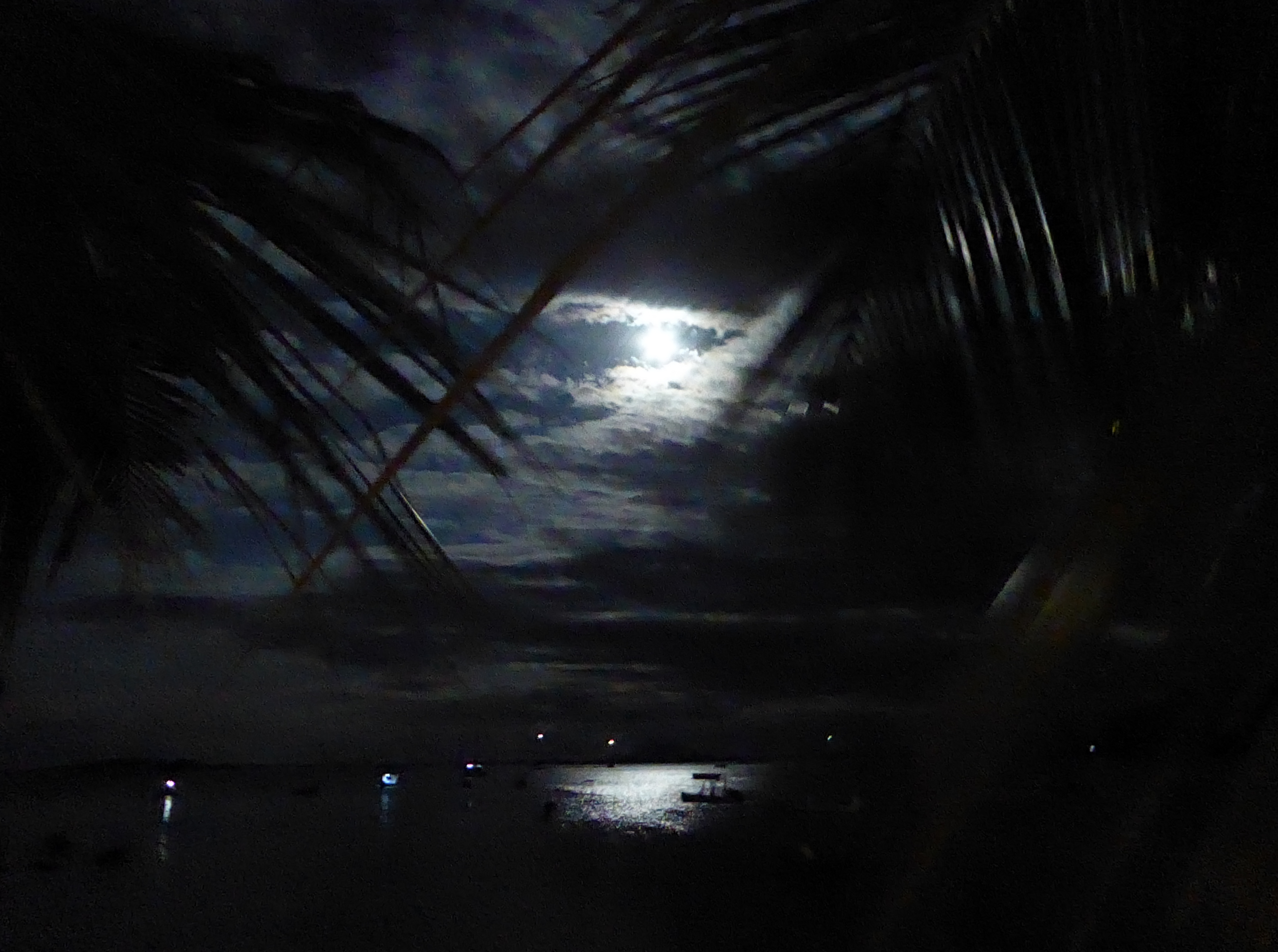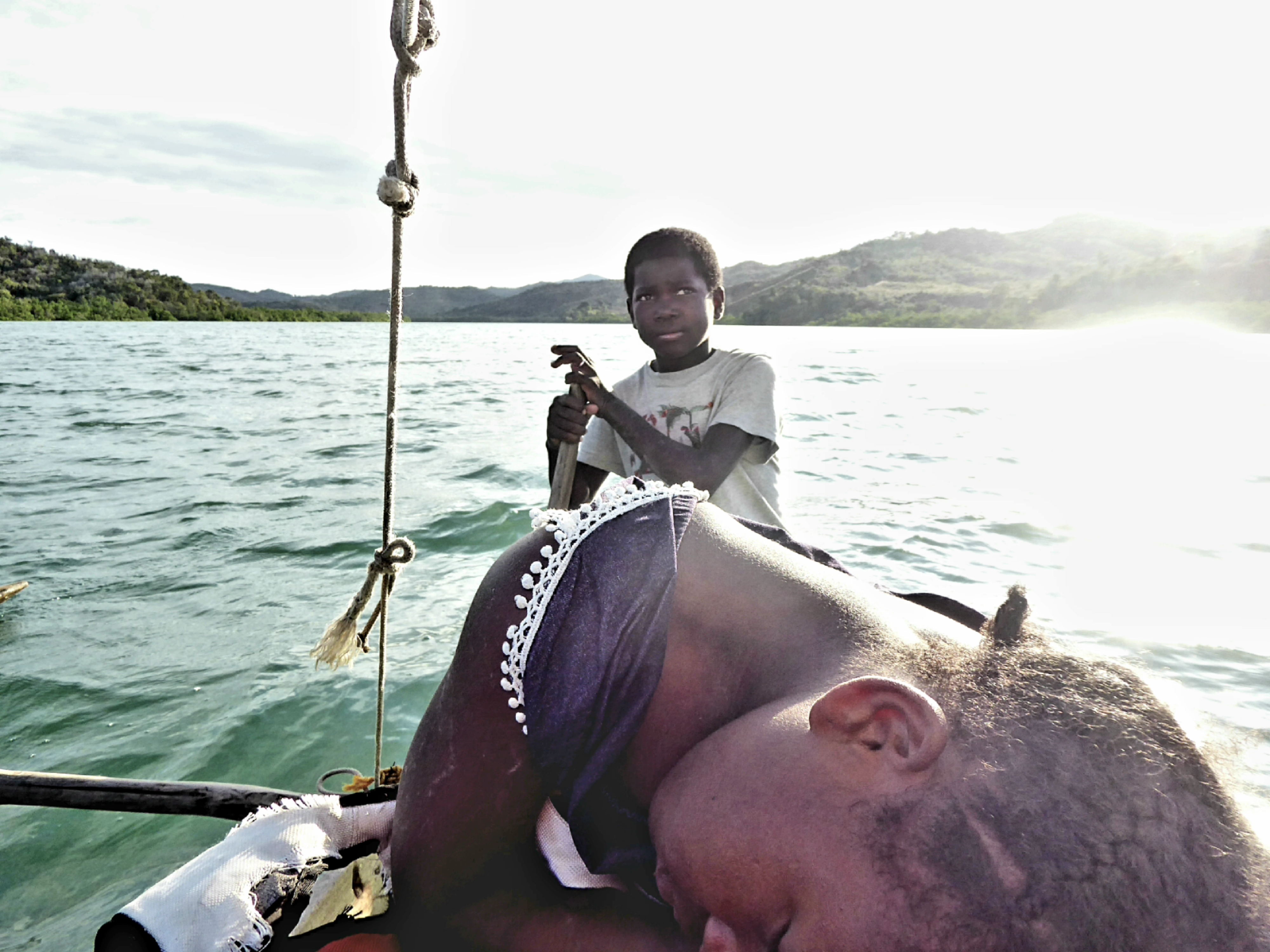
31 August to 15 September, 2019
I received a message from an acquaintance I’d met in Cape Town. She was enjoying her time in Antananarivo. Antananawhat? Antananawhere? I didn’t have a clue how to pronounce it or where it was.
Madagascar
It had an exotic appeal. Ironically, this was the same woman who’d told me about the Okavango Delta and whose name alone inspired me to venture there.
I’d been looking for a place to go after Hermanus and booked, on a whim, a flight to Antananarivo, Madagascar’s capital city, for the end of August.
I knew virtually nothing about the country except its extraordinary biodiversity. At least 80% of its species are endemic: they are found no where else on earth. I was surprised to learn that French, along with Malagasy, is an official language, not knowing that Madagascar had been a French colony from 1897 until 1960. And that it is one of the poorest countries in the world.
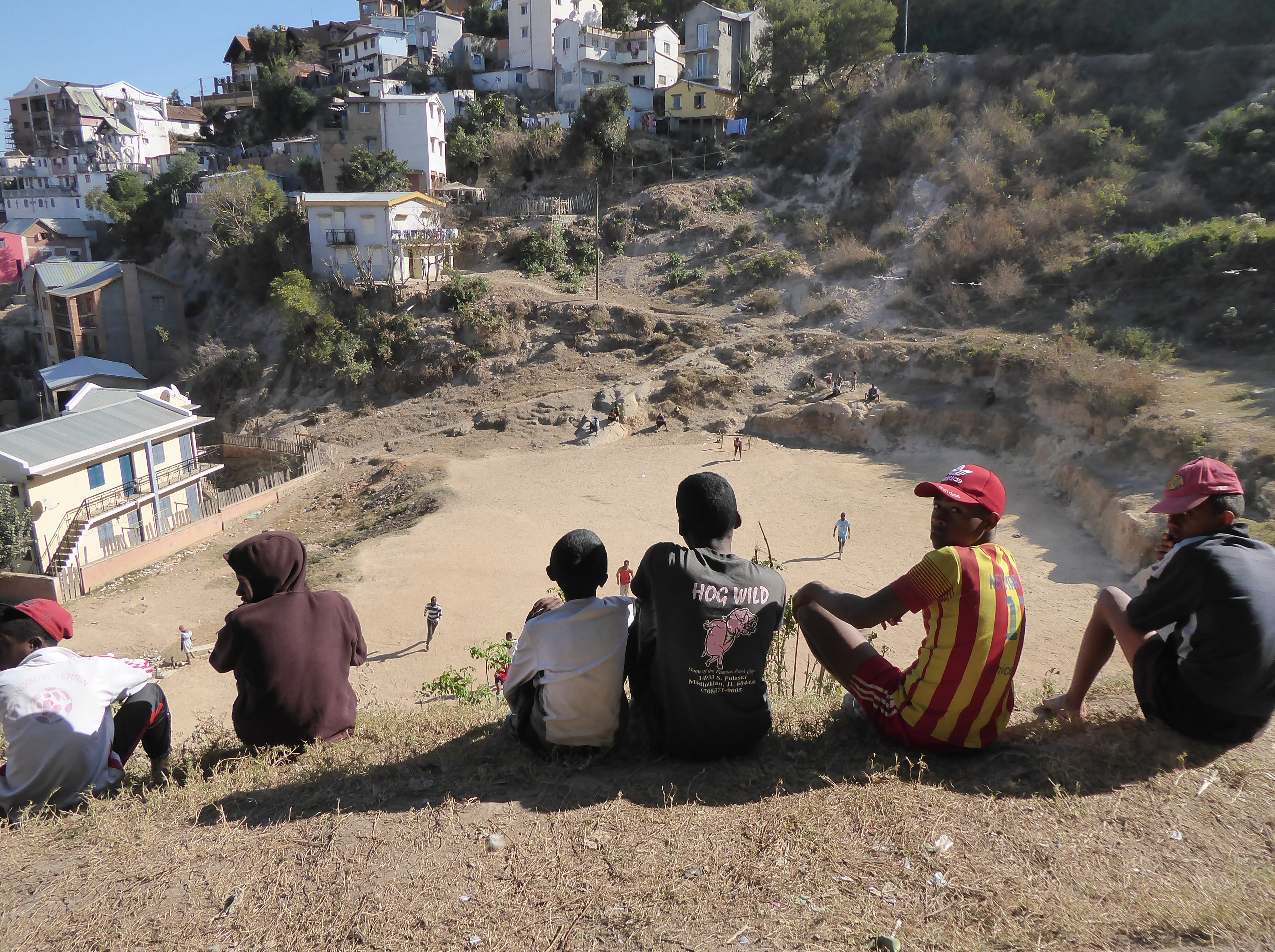
The flight from Cape Town via Johannesburg to Antananarivo was long, but I was looking forward to making the most of the day. I lined up at immigration to buy a visa in the airport.
I handed the woman seated inside the simple glass booth my credit card and passport. “Sorry, cash only.” she responded in French. I’d managed to spend all my U.S. dollars and Euros some time ago. I had only a few Euro coins still packed in my bag.
When I explained I had no cash, this same woman kindly assigned a lovely young woman to escort me to an ATM in the airport. However, it only showed a message stating that my bank was refusing the request. We went back and explained the situation to the woman, now outside the booth, standing elegantly in high heels and miniskirt. This is not the first time we’ve run into this problem, she said with more empathy and kindness than I expected.
By this time I was thinking about the driver who my accommodation had arranged to pick me up. The woman suggested I go with the escort and driver to an ATM outside the airport. Remarkably she apologized for the inconvenience and expressed her frustration with the lack of a credit card machine.
We met the driver, who looked relieved to see me, and explained the situation. We set off in his weathered Citroen on congested roads to a nearby bank. An endless line of people were waiting. “We are not in luck. Everyone gets paid today, the last day of the month. All the banks will have lines like this.” My companions looked ready to wait the inevitable few hours, but I was concerned my card wouldn’t work anyway. I suggested we go back to the airport and find another solution.
The elegant woman remained remarkably kind. I couldn’t imagine another airport official anywhere behaving as she did. But despite her concern and empathy, the rules were clear. No visa, no entry into Madagascar. I began to imagine spending the night in the airport.
Then she and the driver offered to do the unimaginable. She would pay for my visa herself, arrange for the driver to transfer that money to her, via his phone (he had no cash either), and I would pay back the driver.
I soon had my visa.
The driver calmly maneuvered his taxi as carts pulled by men and beasts, cars, motorcycles, and trucks all competed for space on the exhaust-filled narrow roads. Men, women, and children were selling or buying things from small makeshift shops along the roadside. Women with packages piled on their heads wearing colorful fabrics strode along. Some people sat observing the passersby. We made our way slowly toward the bustling city center.
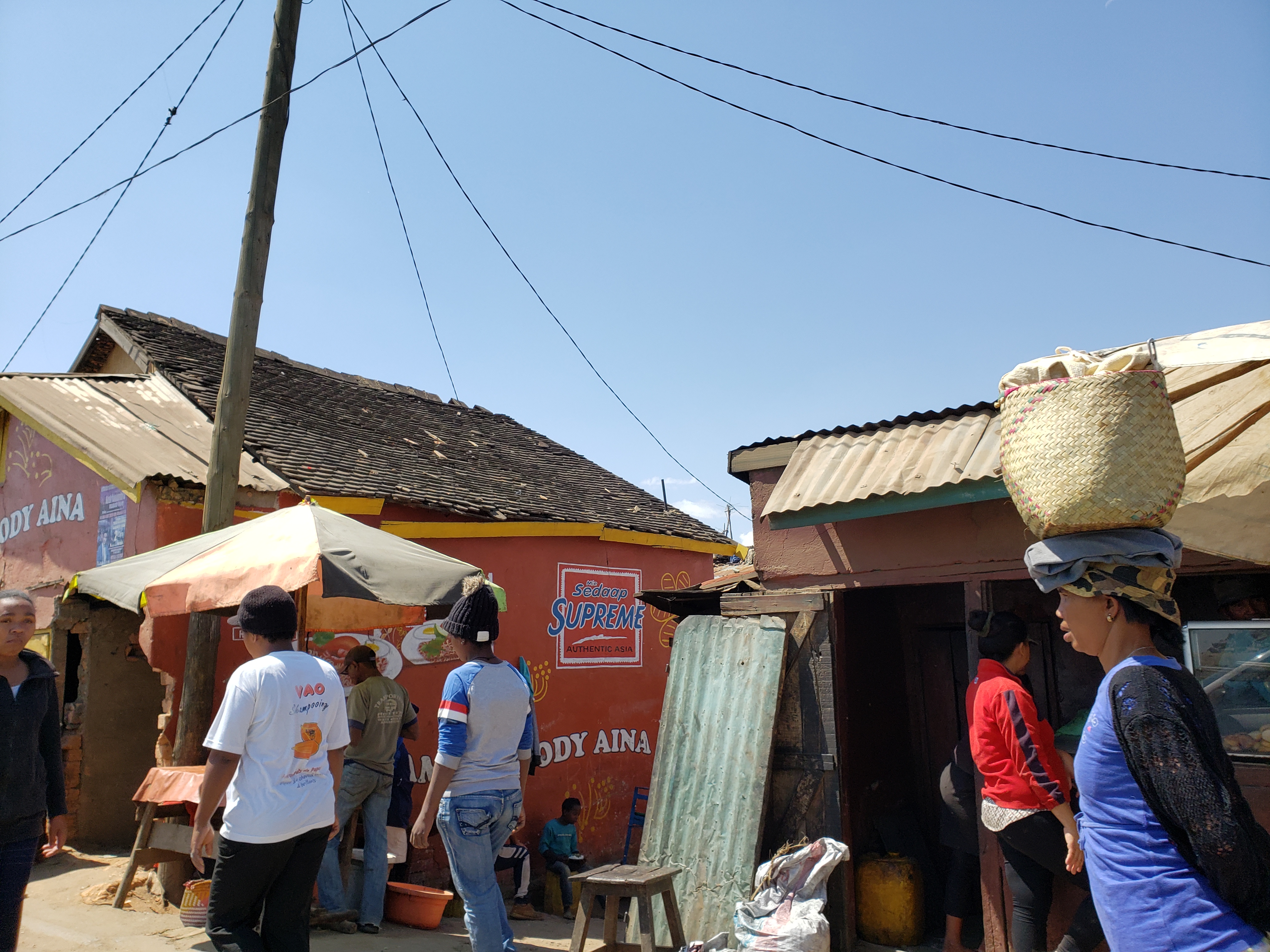
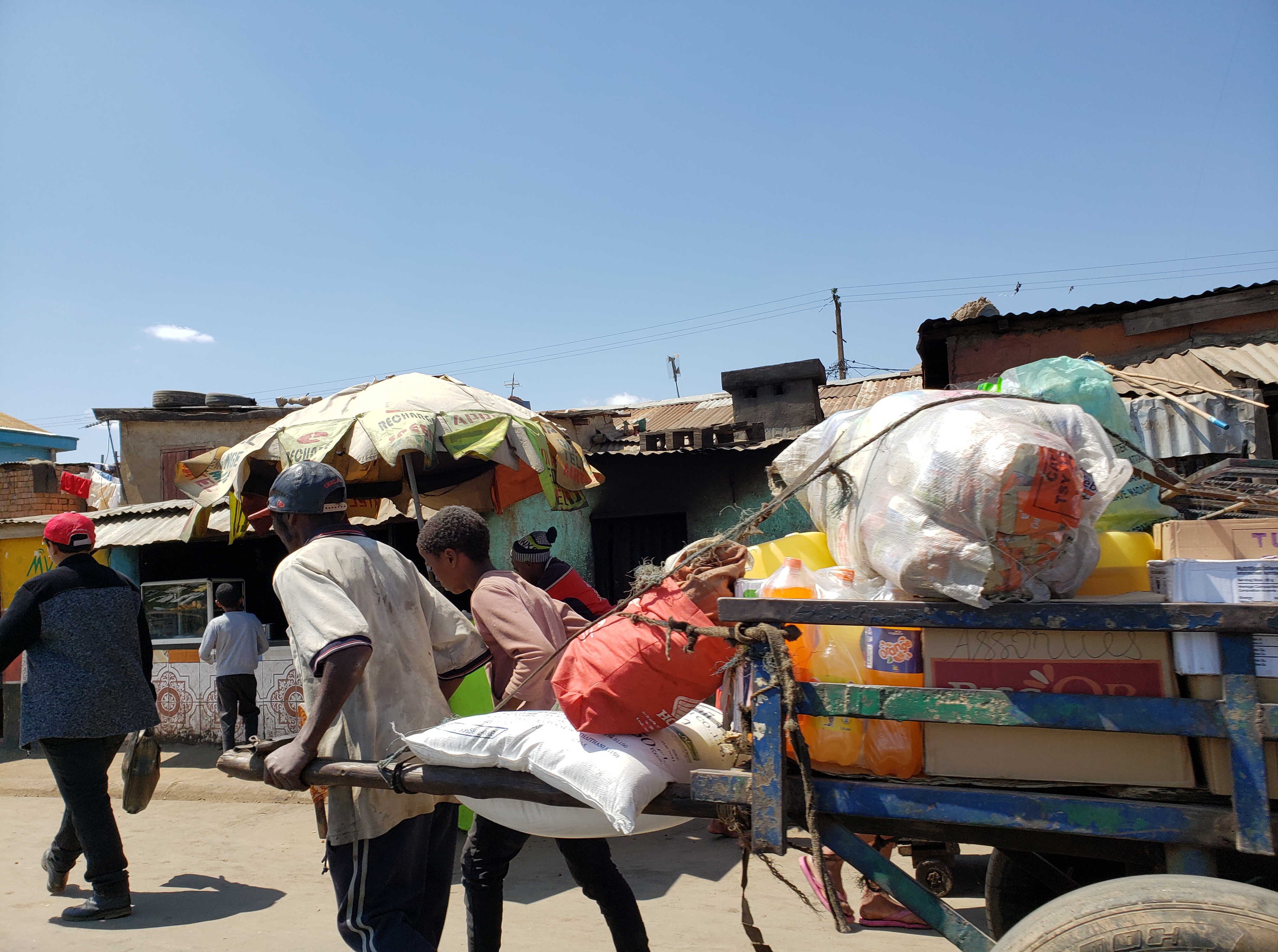
I spotted an ATM, and miraculously only a few people were standing in line. I got out to try my luck and was rewarded with enough Malagasy ariary to pay the driver and get me through the next few days. Having repaid my debt I sat back and enjoyed the ride.
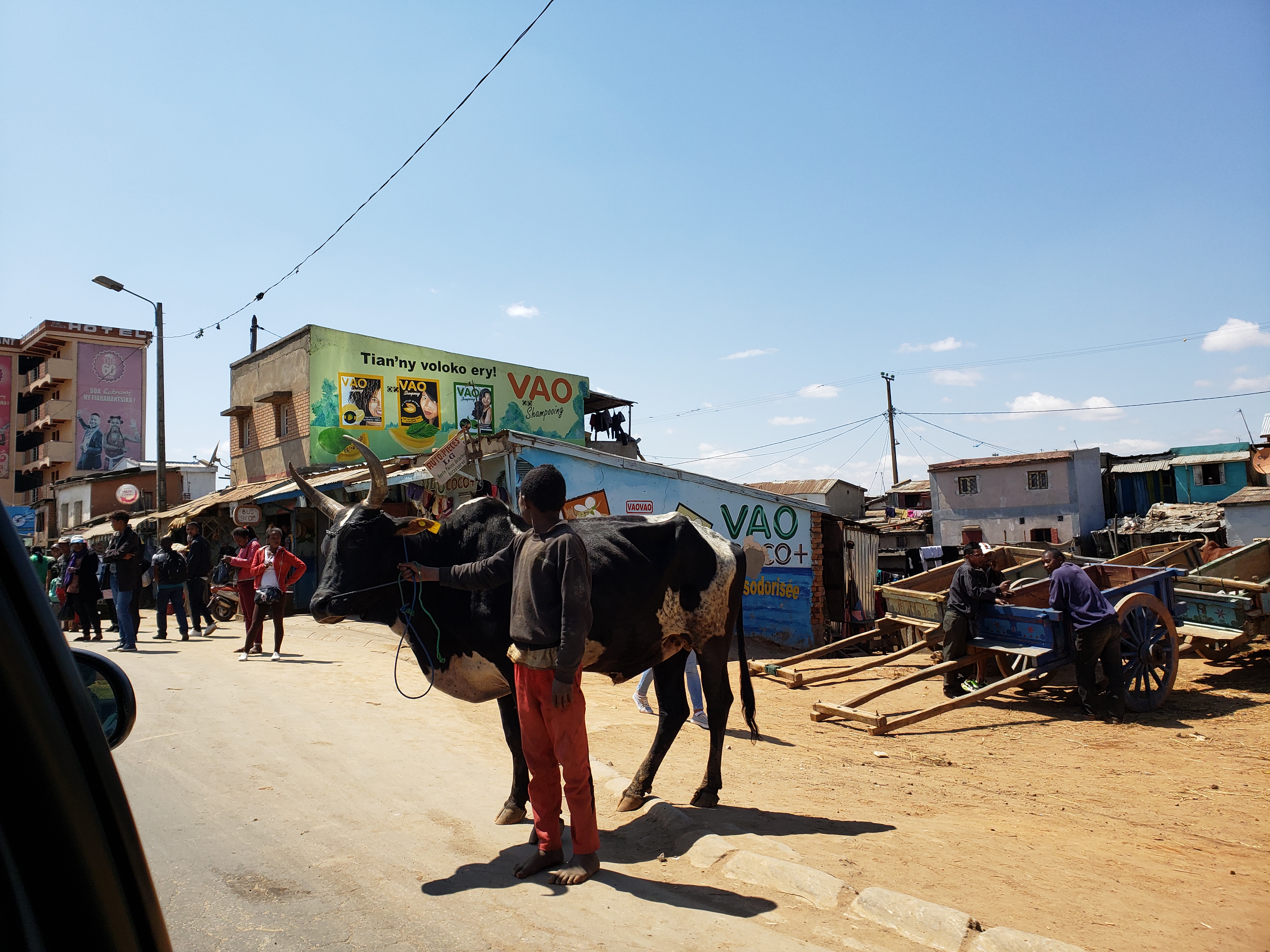
I’d rented one of several apartments for tourists in a beautiful old brick building perched at the top of a very high hill. I enjoyed magnificent views of the city and of the Queen’s Palace next door. (The palace was abandoned after the French colonization and consequent fall of the Madagascar monarchy. ) The view also displayed the city’s extraordinary economic disparity. Cafes, restaurants, and hotels catering to tourists and well-heeled locals contrasted sharply with the impoverished neighborhoods.
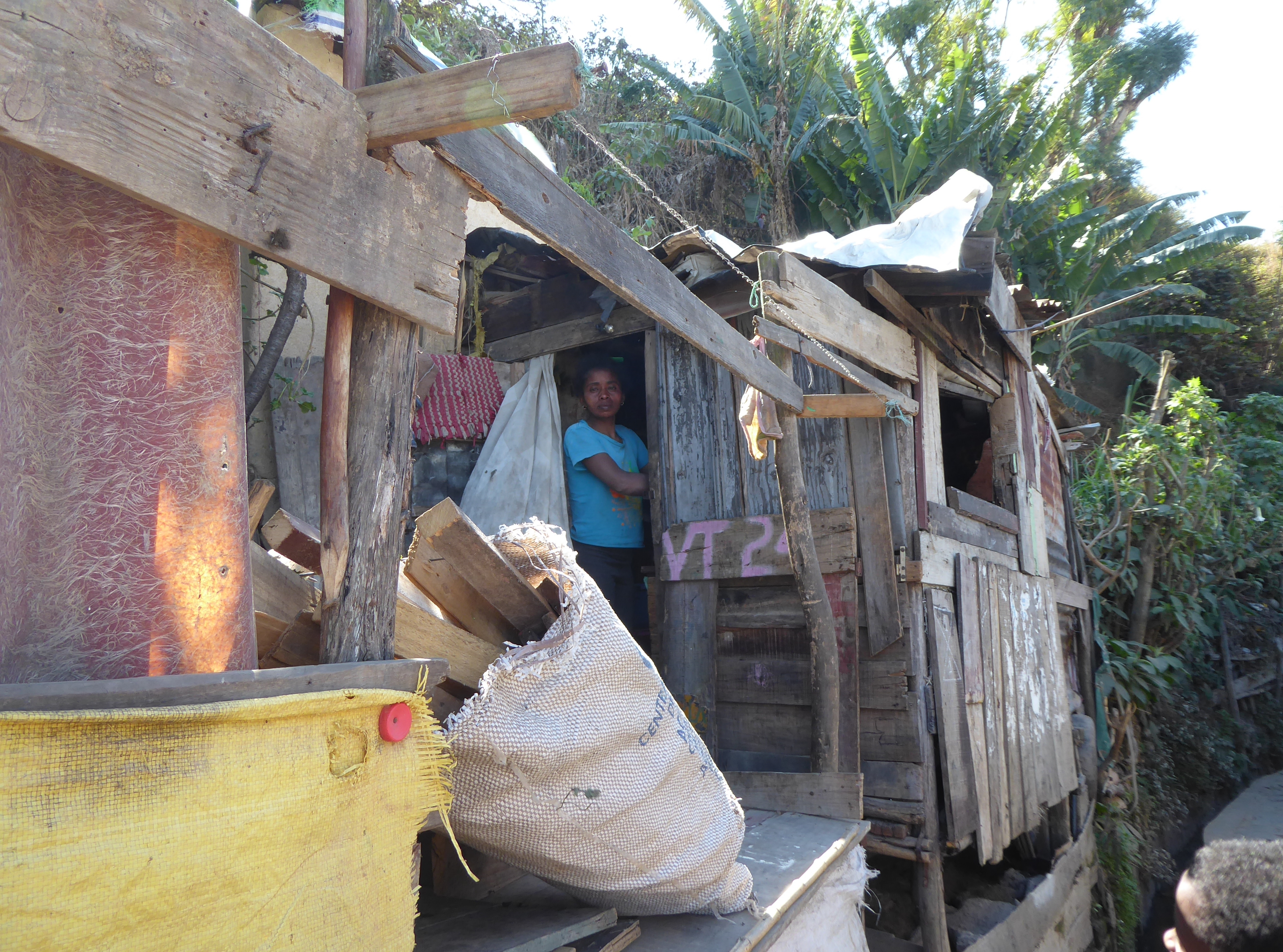
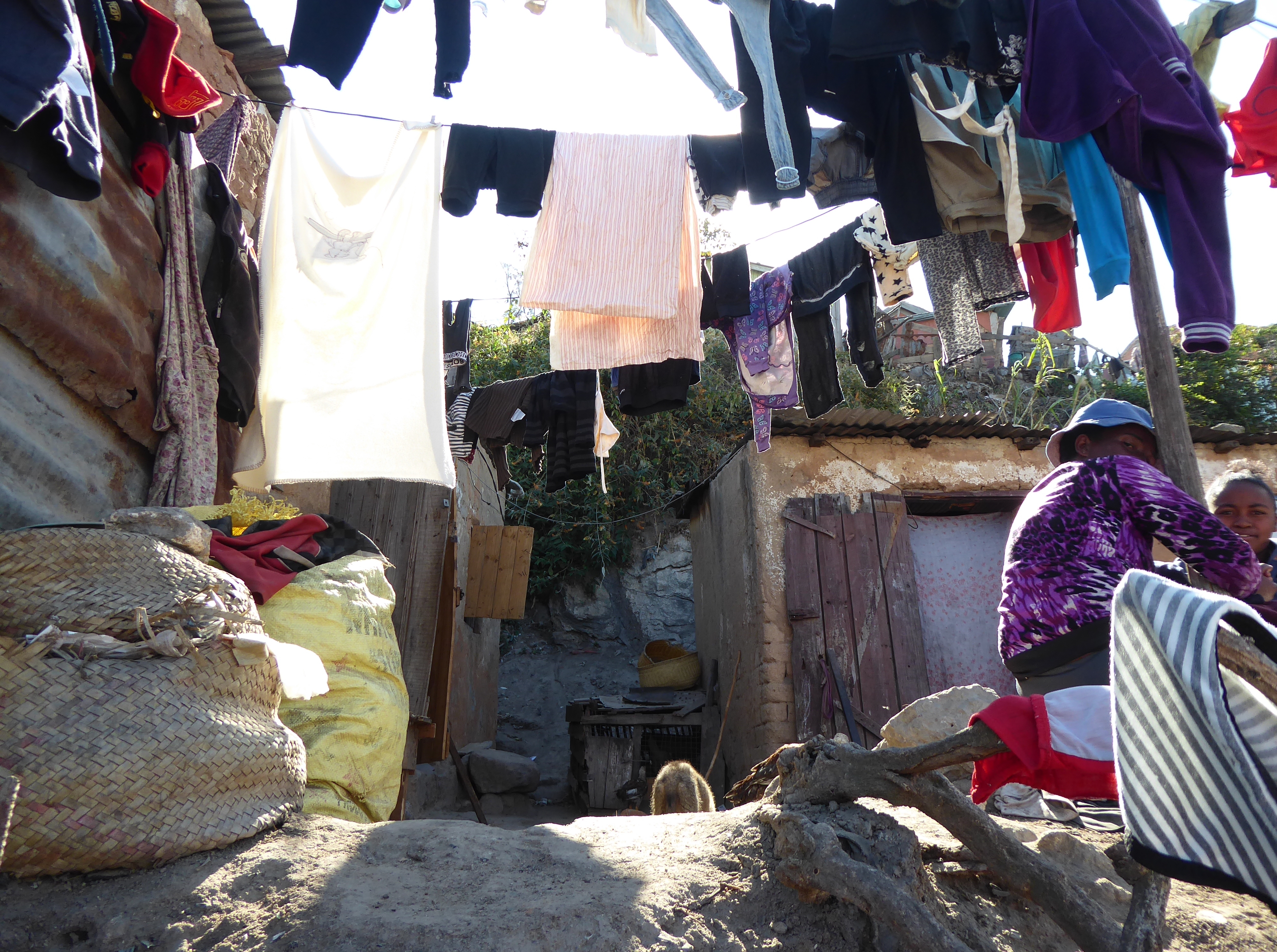
I was given conflicting messages about the city’s safety but my strolls alone during the day felt safe and secure. In the evenings I was escorted short distances by the building staff and took taxis.
Wishing to meet some residents, I used Couchsurfing and met a Lebanese photographer, Toni, and Tim, a Frenchman who worked for the telecommunications company. Both had lived in Antananarivo for years with no immediate plans of leaving and graciously offered their delightful company. I dined with Tim at a high end Italian restaurant where our conversation flowed from travel, to linguistics, to literature seamlessly until noticing all the other diners had gone, and the hour.
Toni invited me to partake in his mother’s cooking, generously carried from home by his visiting sister–the reputation of Lebanon’s fine cuisine is not exaggerated. Travel tales were swapped and Toni’s bold risk taking and ample harrowing experiences had me wondering if he was an adventurer or a masochist, but he was kind and caring and living his life exactly as he wished to.
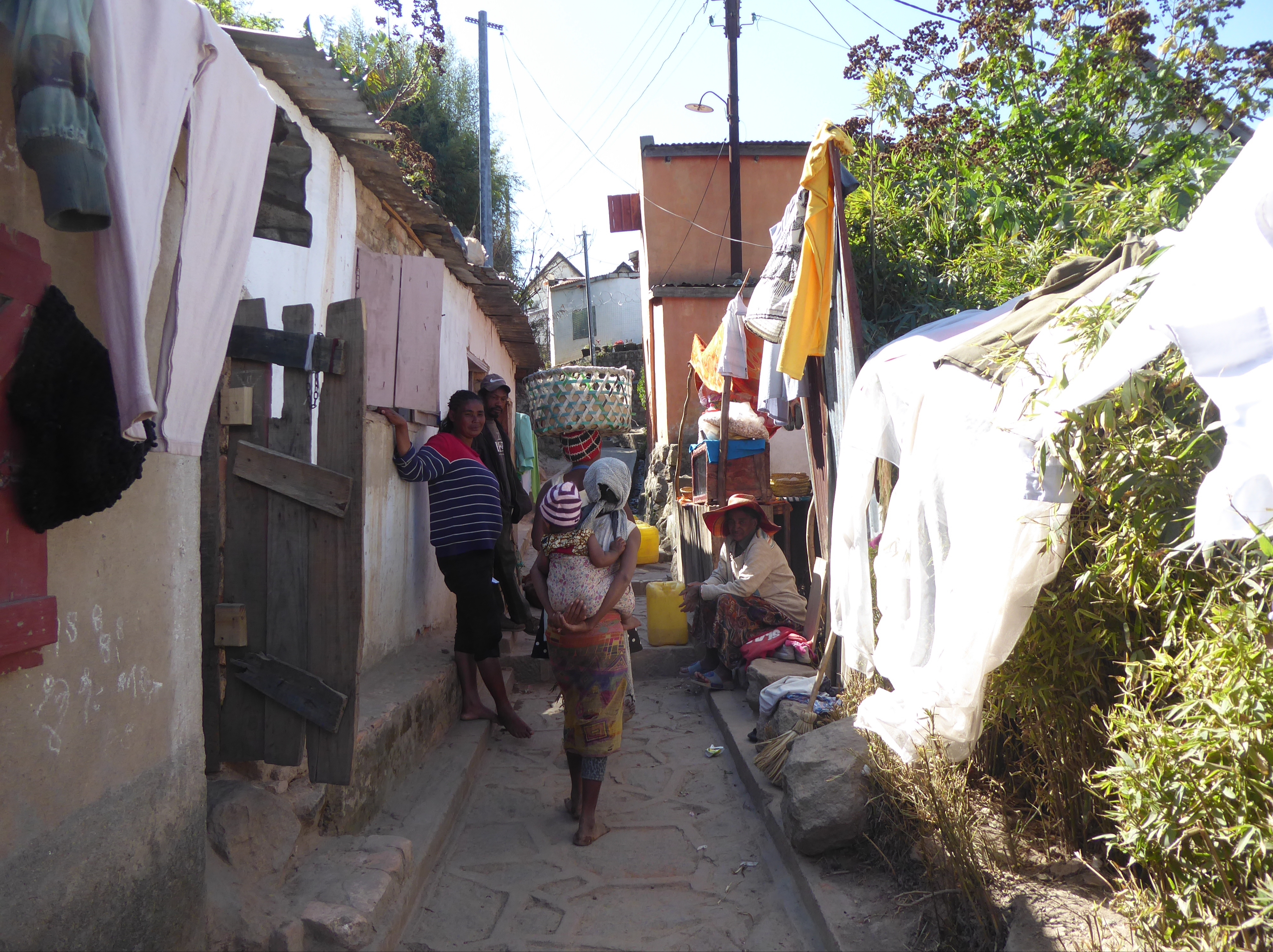
I met a guide working at the Queen’s Palace and arranged for him to walk me through his neighborhood. There was poverty, but also happy children and a robust community life.
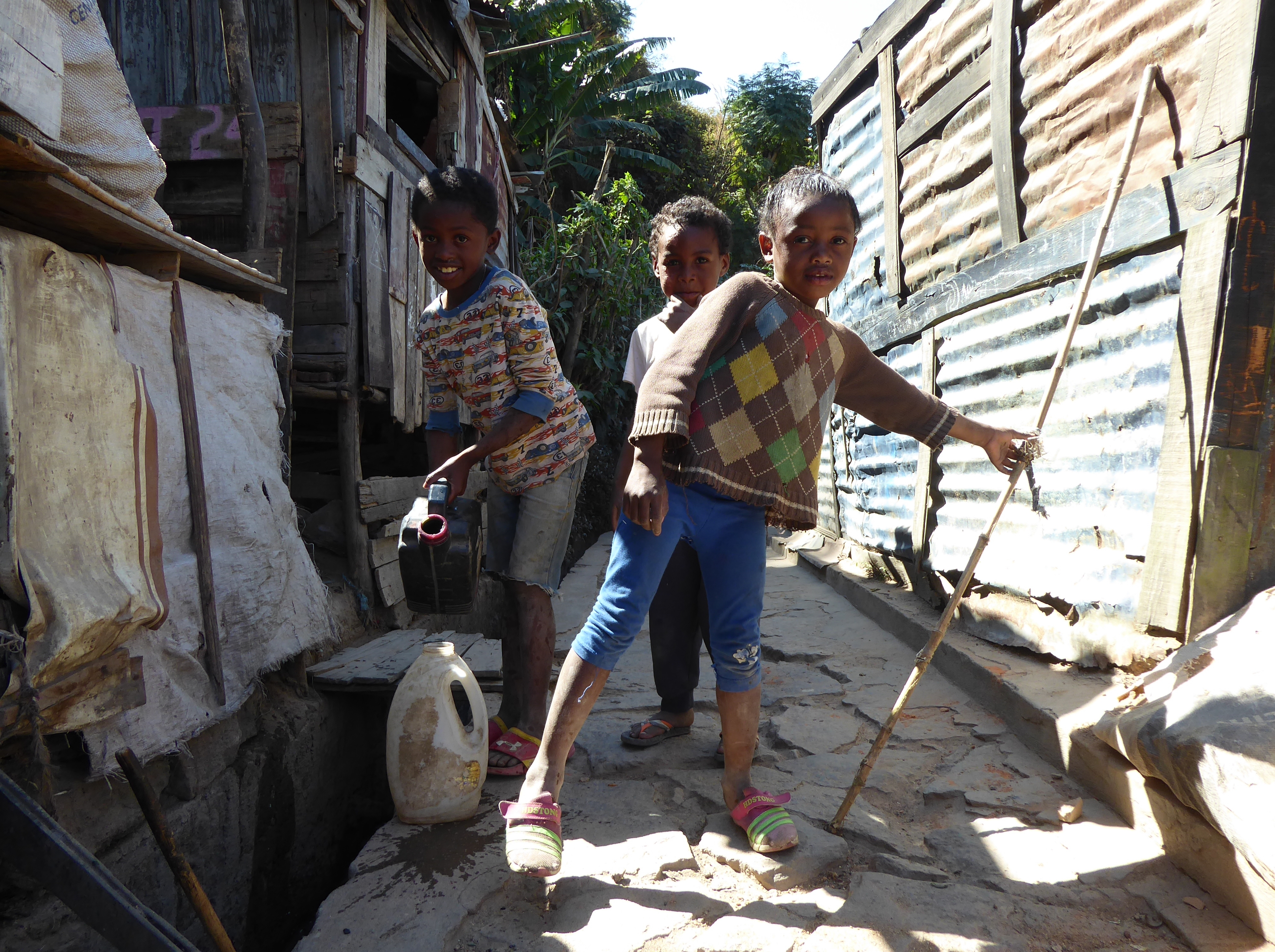
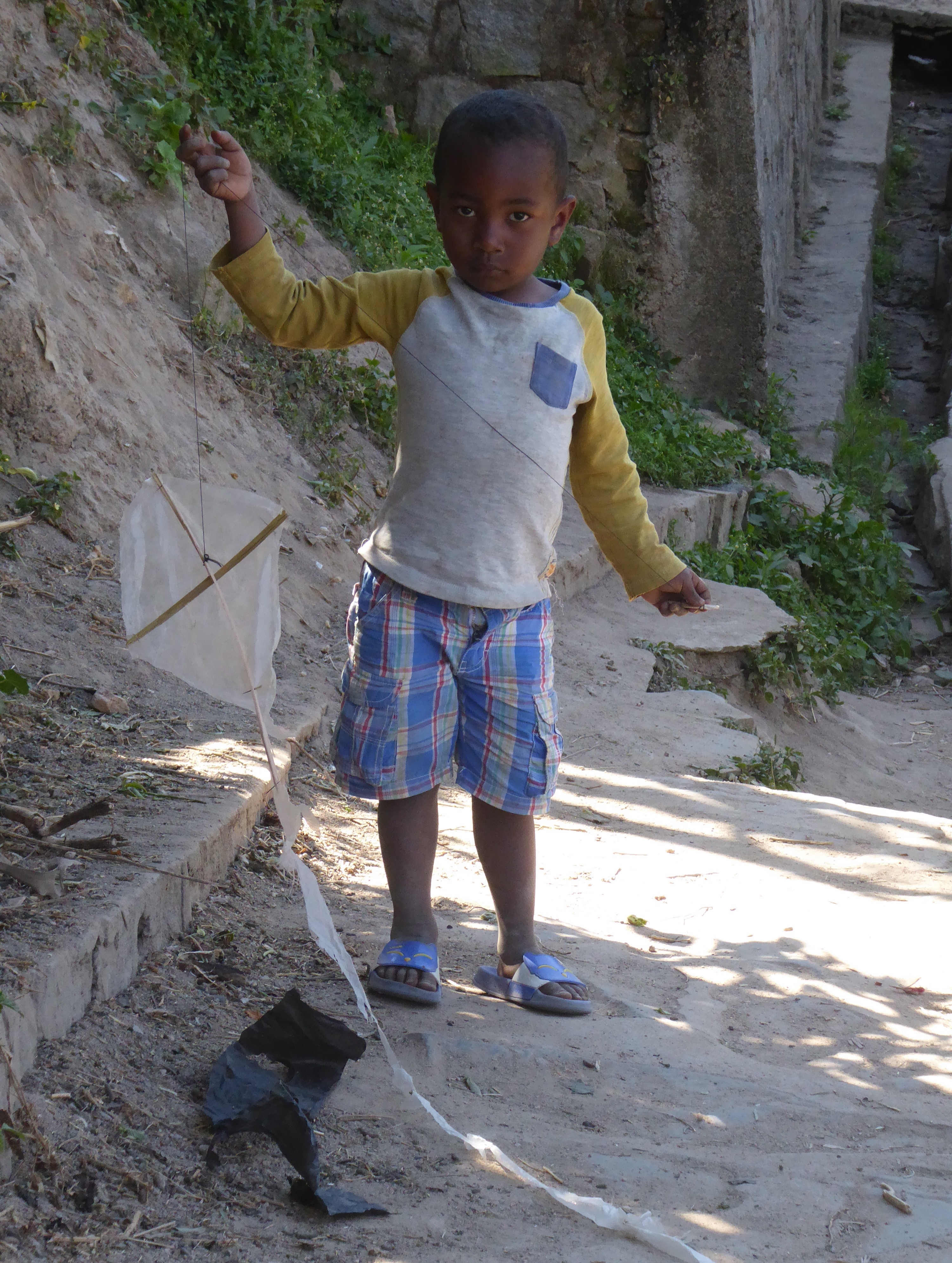
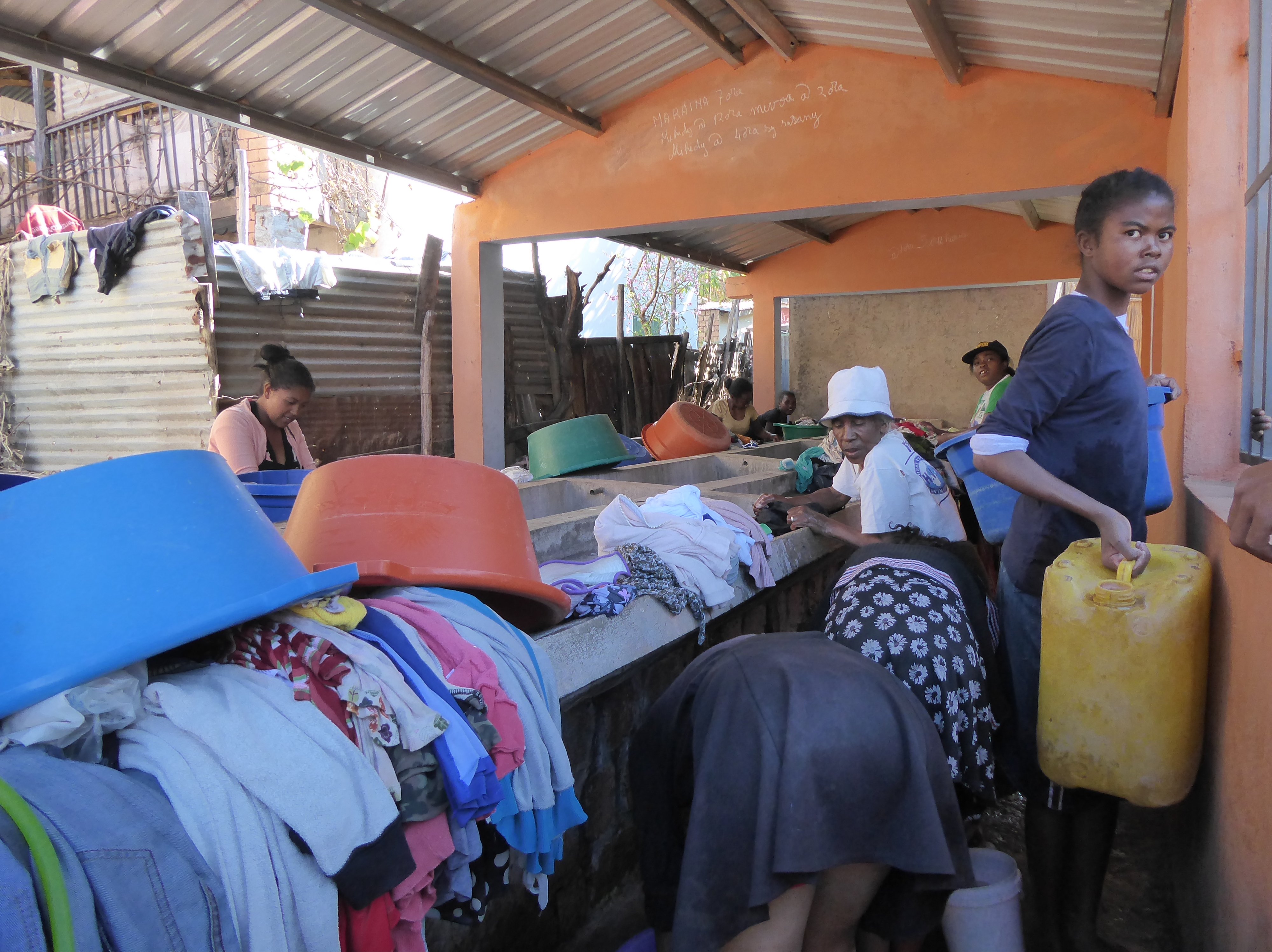
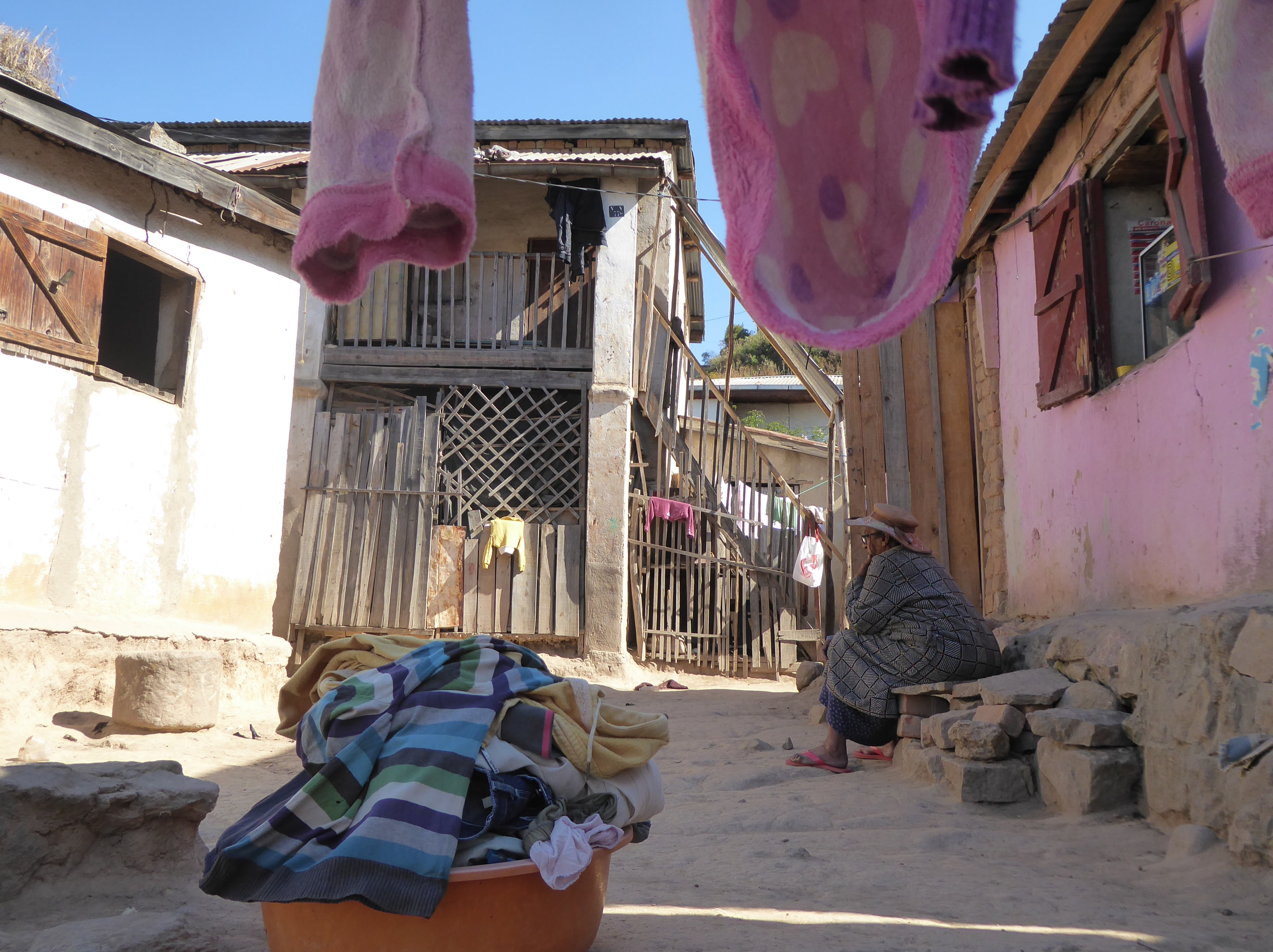
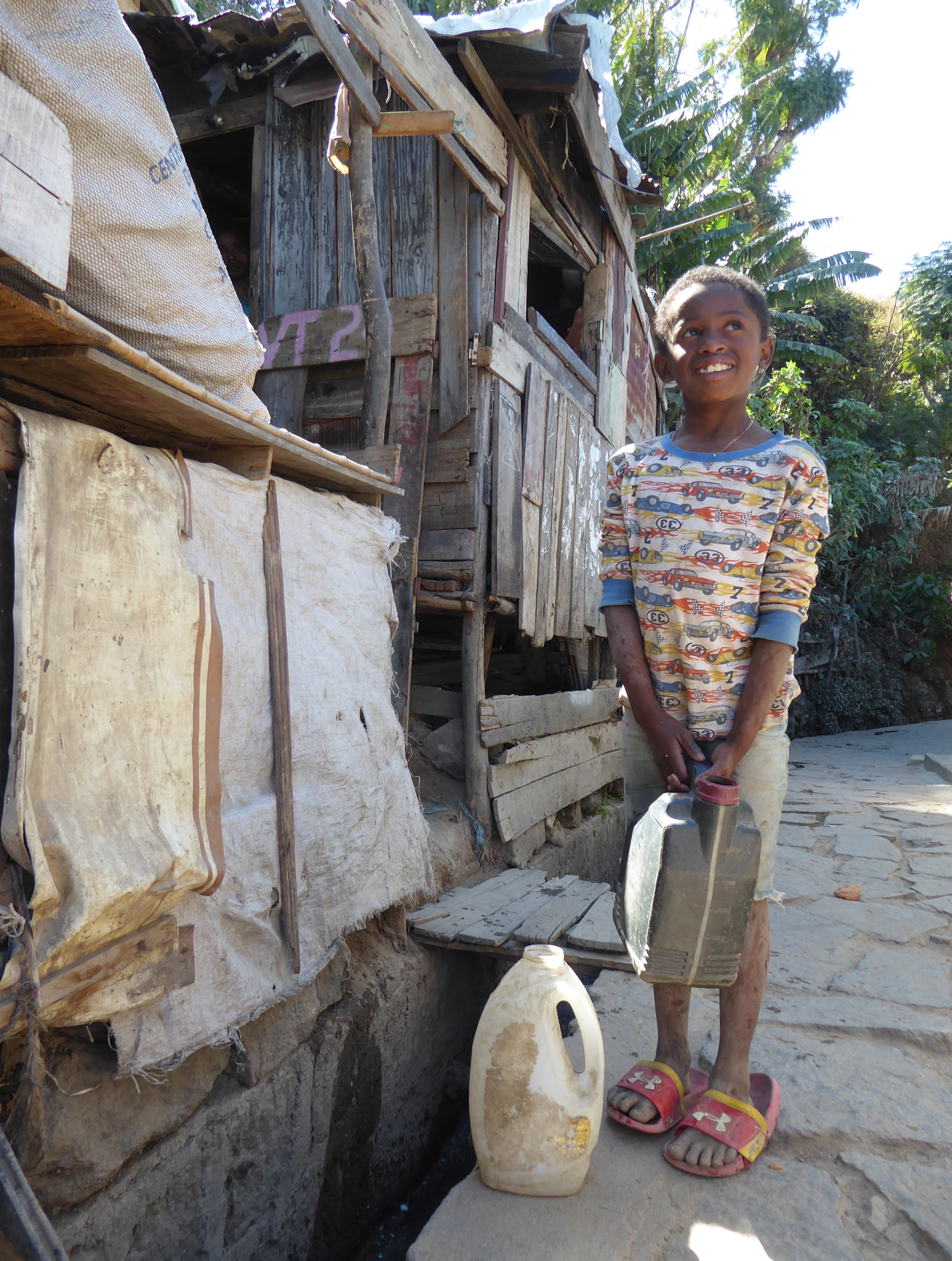
Antananarivo was a fascinating vibrant city, but after five days I sought a more tranquil, natural setting.
I learned that the country’s roads were terrible and travel was extremely taxing, unless one flew. I wasn’t up for any hair-raising, bone-rattling adventures like Toni’s so I opted to fly to Nosy Be.
I heard Nosy Be in the north was touristy, but also astoundingly beautiful. I booked a private room for several nights in the highly rated Tamana Hostel, smack in the middle of its major town, Hellville.
After making the reservation I heard that Hellville matched its name. Sex tourism was apparently rampant and permeated the area with sleaze. It was too late to make any changes.
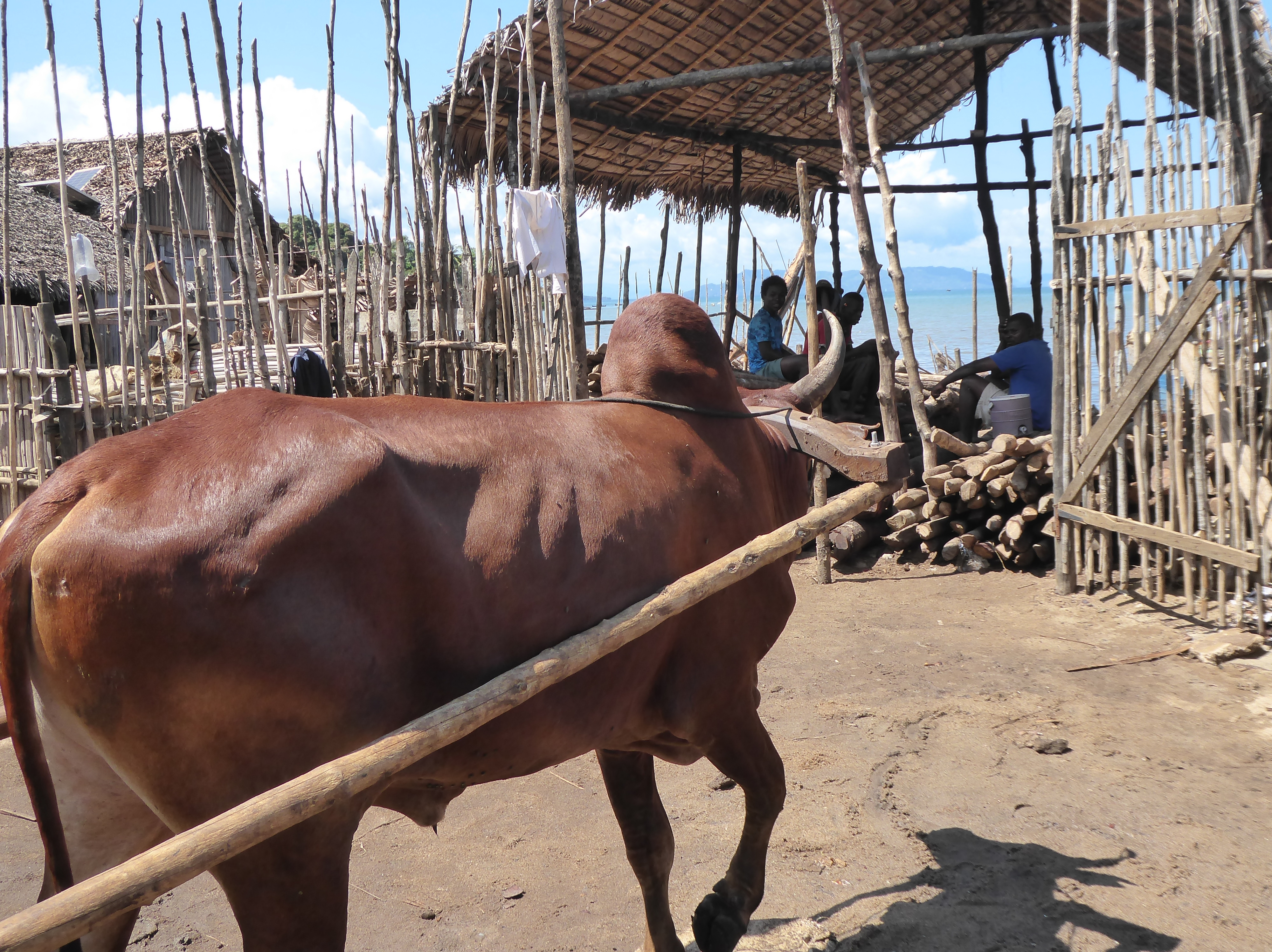
Fortunately, Hellville pleasantly surprised me. It had a relaxed, small town atmosphere, the tourists were largely outnumbered by the locals, fishermen and their boats lined the coast, and markets were inviting and offered delicious local cuisine. The unsavory aspects were mostly hidden, at least from my eyes, and the hostel, with its large rooftop terrace and sea view, was clean, comfortable, and quiet.
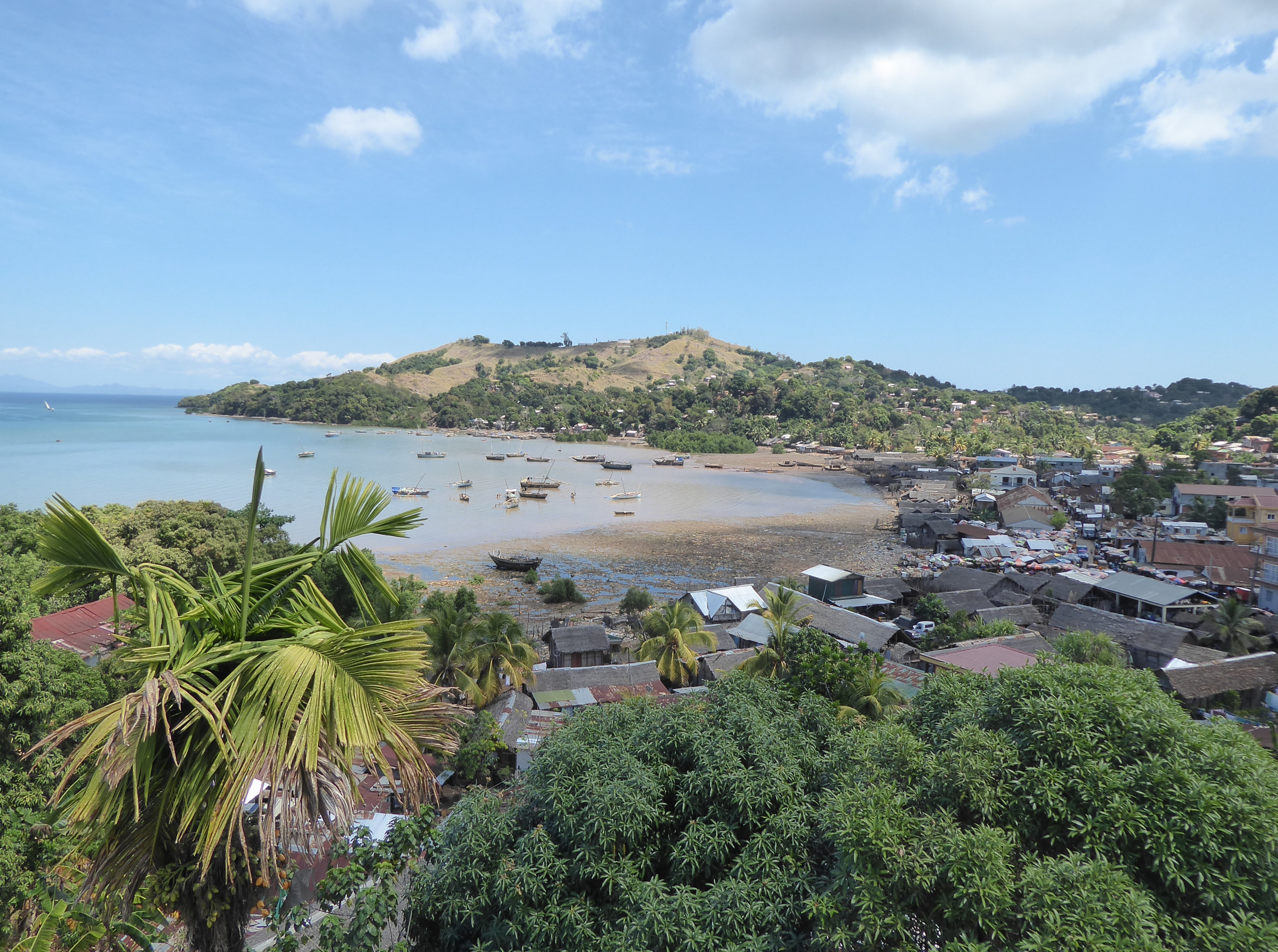
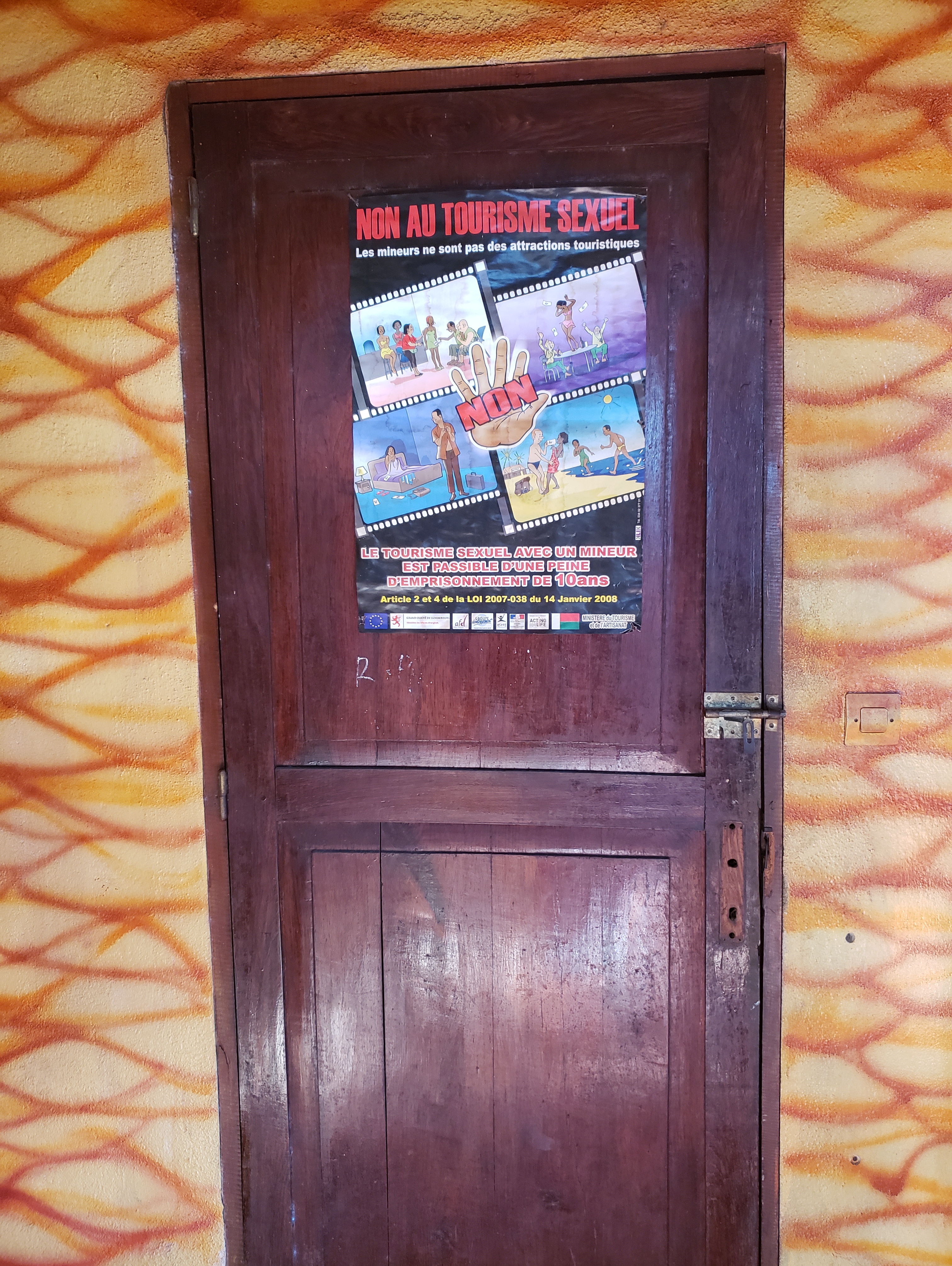
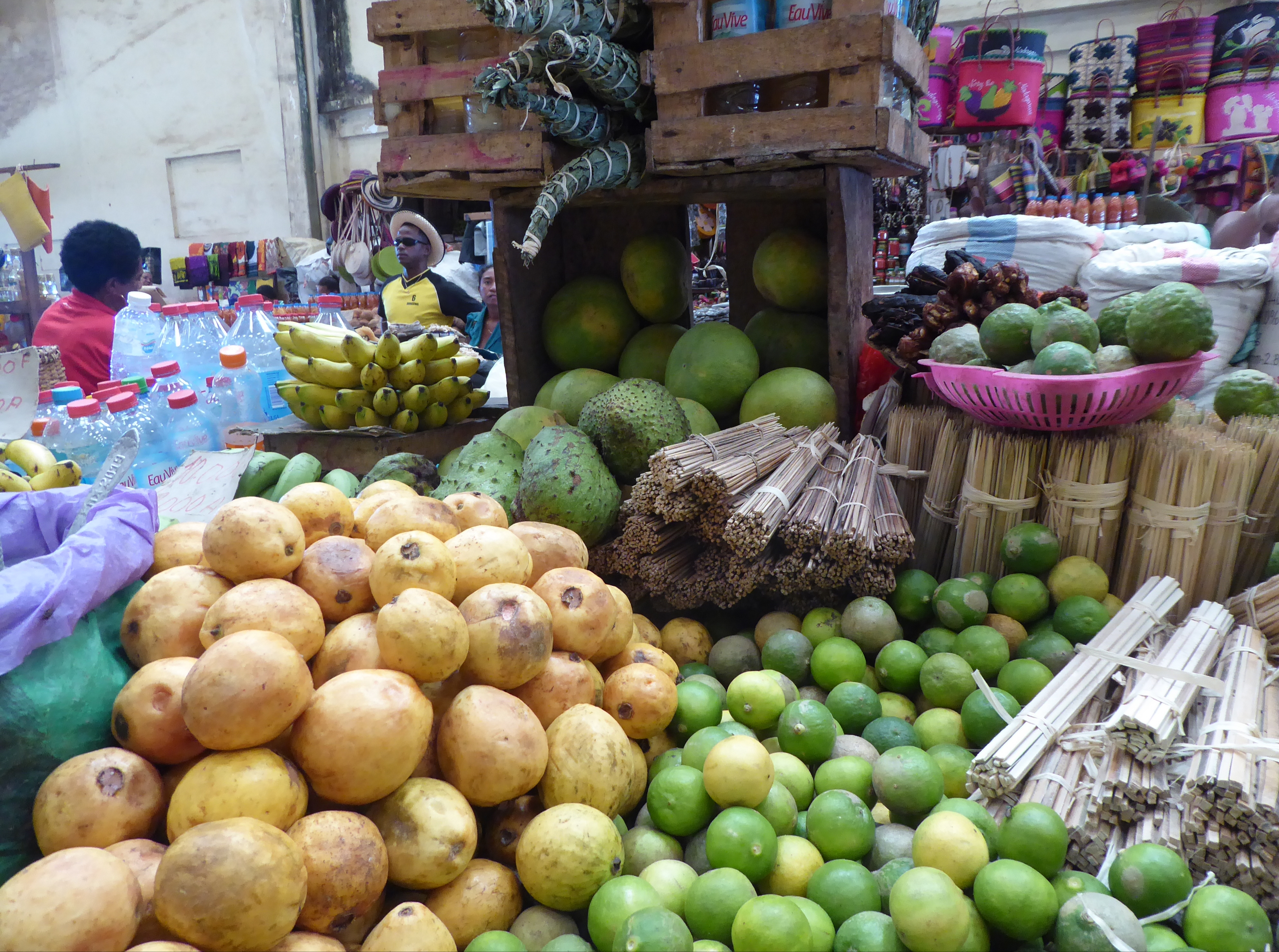
On my second day at the hostel I met a nineteen year-old German, Alex, traveling alone for the first time, who was open to do some exploring. We hired a young, handsome tuktuk driver donning silver aviator sunglasses, a bright red tee-shirt, shorts, and no shoes to take us to Lokobe National Reserve, about forty minutes away. We only had a vague idea what to expect, but the staff at the hostel highly recommended the reserve.
After leaving a paved uneven road, we were soon traveling on one of dirt. There were no cars or people except a few local men walking and carrying machetes. They gave us a look and given the isolation, and movies I’ve seen, the moment felt a tad disconcerting. Moments later we made a turn off to another dirt road and five men rushed over to the tuktuk. One jumped in next to the driver, the other four hitched a ride on the sides. The driver stopped. The man in front started shouting at the other men in his native tongue, then turned to us. It all happened quickly and it was hard to figure out what was going on. Then he put laminated photos of lemurs and forest into our hands. The others tried to do the same. It became clear they were all seeking business as guides.
The man sitting next to the driver, and older than the others, held his ground. He continued speaking sharply to the other men, who in time conceded their positions. He then offered us in a markedly sweet tone, a day’s tour including lunch.
After some discussion, we agreed. The man, Freeman, turned out to be all bark and no bite, at least with us. He was knowledgeable, patient, kind, and gave us a wonderful leisurely tour. We continued on the tuktuk a short ways to the sleepy town of Ambanoro. Freeman, Alex, and I got into a pirogue, the traditional canoe with outrigger. Although Freeman did most of the work, Alex and I took turns rowing with the extra oar. It was not an easy task.
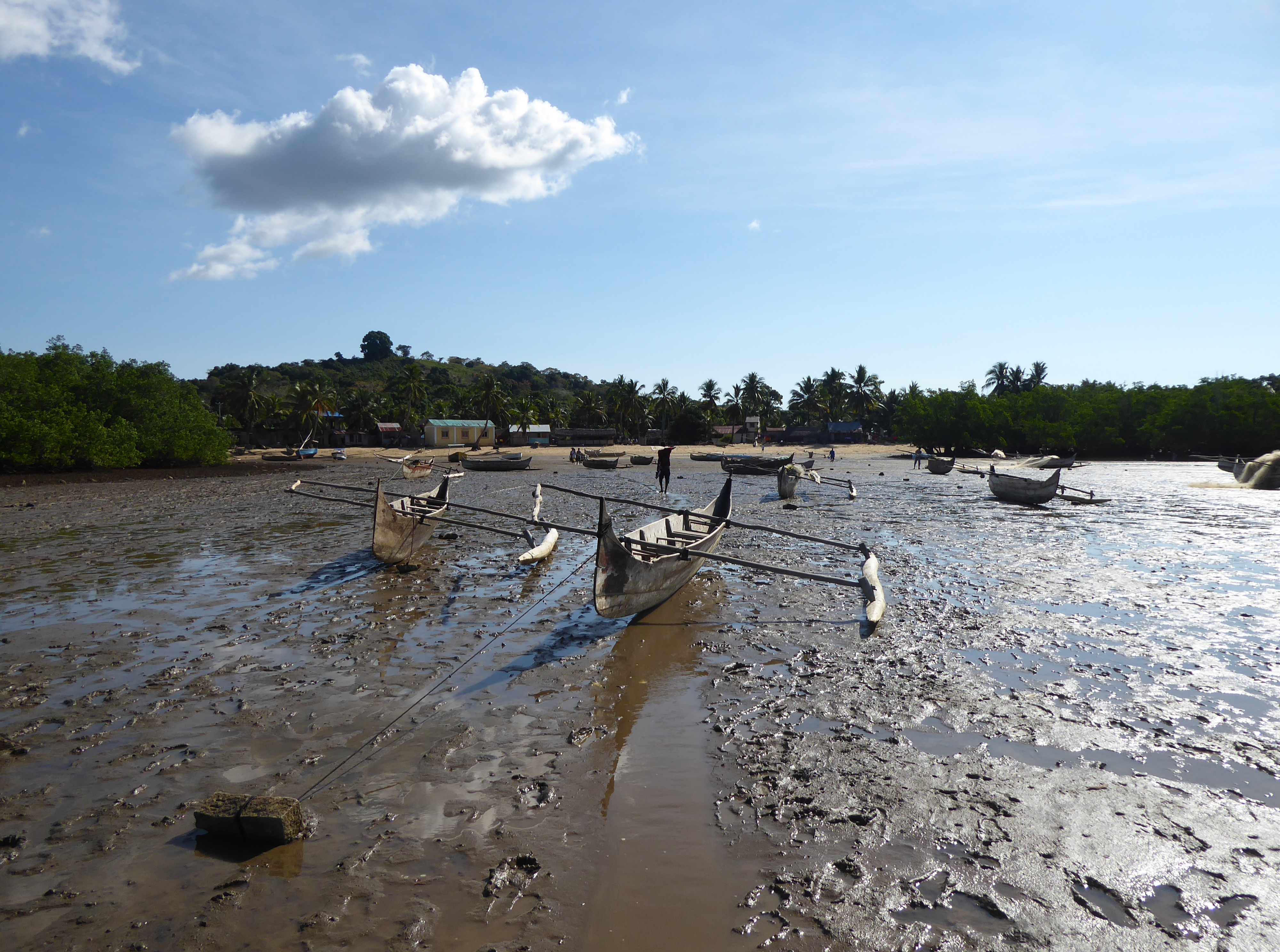
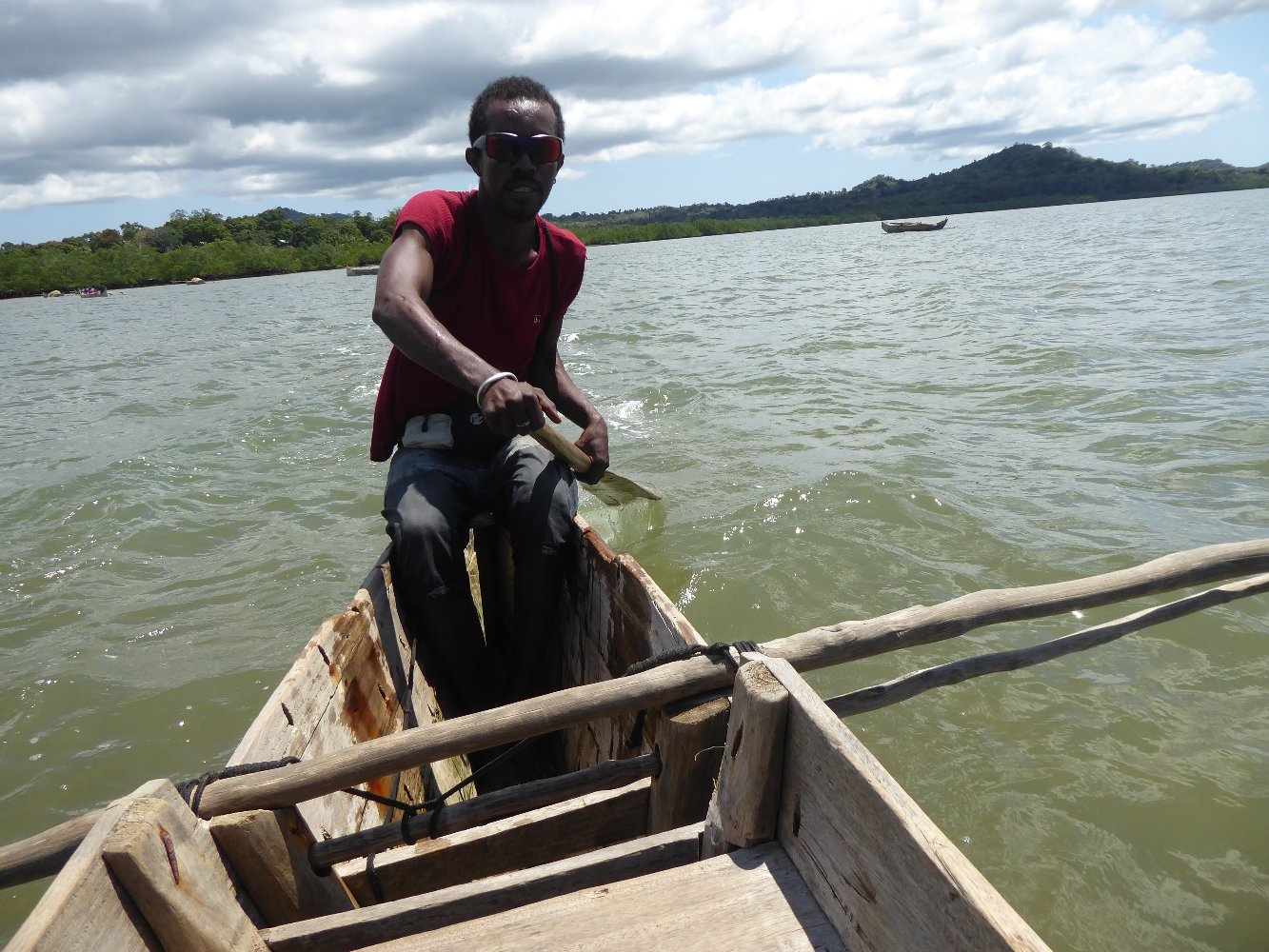
We then hiked through a dense forest where lemurs leapt around us. We stopped to observe the wondrous diverse flora, and tiny spotted frogs. When we got back to Ambanoro, several hours later, Freeman brought us to a terrace where Alex and I sat overlooking the sea. Soon after he served us a delicious lunch, that he’d prepared himself, of fresh fish, rice, vegetables, and pineapple.
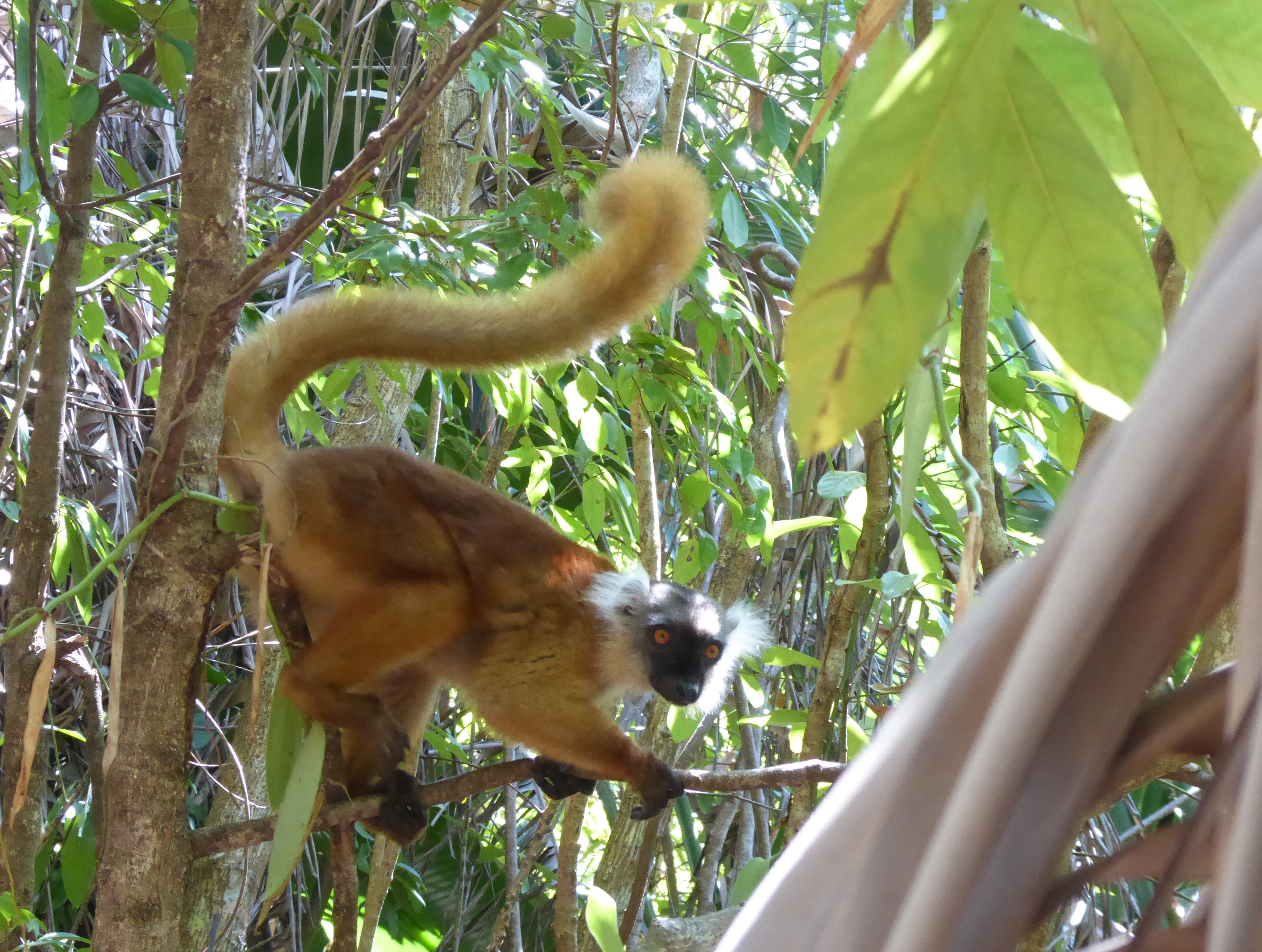
We were the only tourists in sight, besides a small group of Italians who’d arrived with a guide in an organized tour. It was easy to understand why Freeman had been so aggressive with the other men. They would probably not be making any money that day.
Our tuktuk driver, as agreed, had waited to take us back to Hellville. He was comfortably stretched out napping when we walked over.
Both men had given us a splendid day for fares that pleased all of us.
With my reservation at the hostel coming to an end in two days and no plans, I looked at the Couchsurfing site for ideas. There was an unusual and enticing offer to spend a week on a fifty-three foot ketch presently docked in Nosy Be. The dates worked out perfectly.
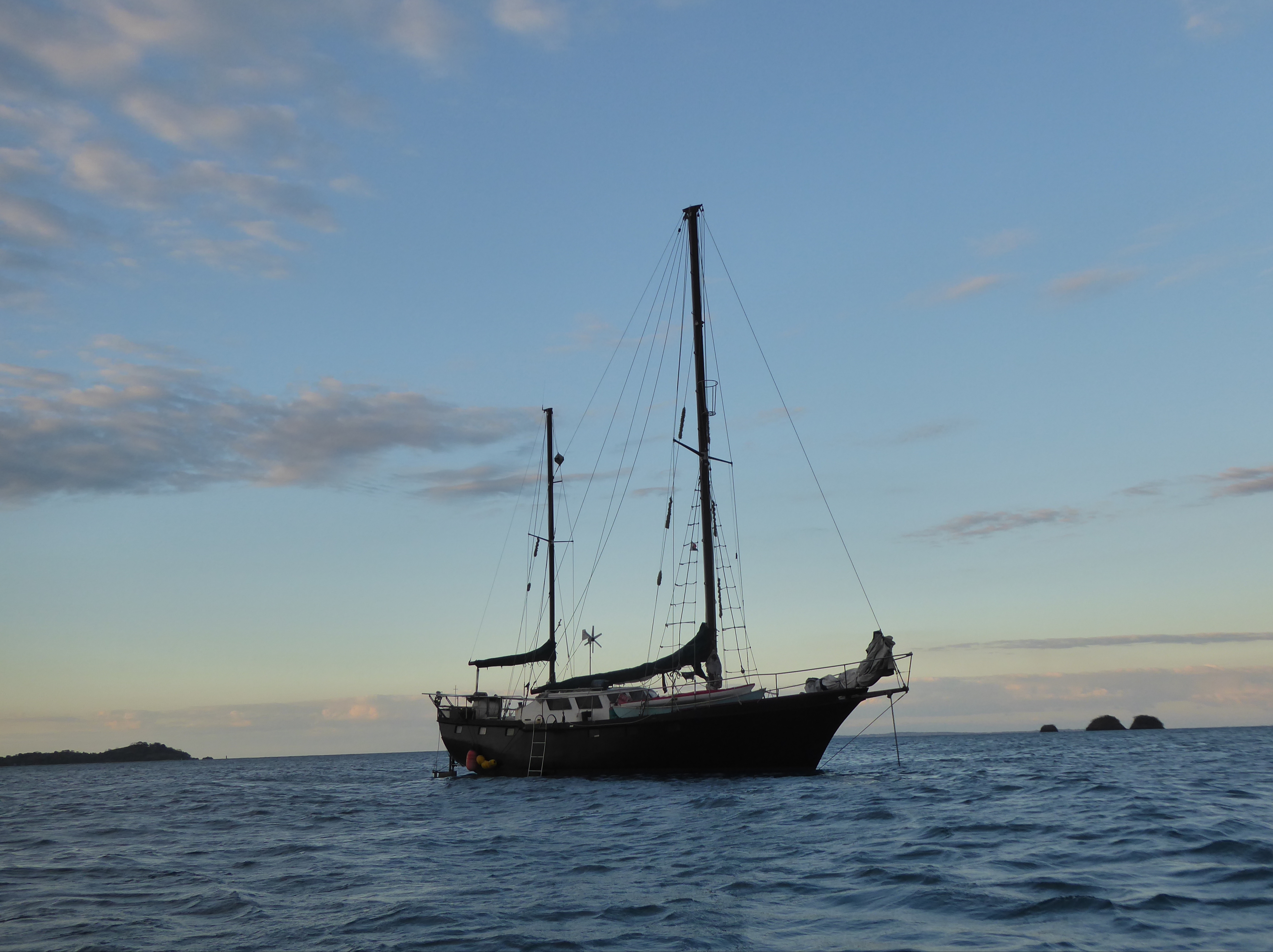
I contacted Tom, the host, for more information and we set up a time to meet later that evening. Tom and his crew had just spent five months sailing across the Indian Ocean. Four of the crew members were now going their separate ways and Tom, his girlfriend, Emma, and one last crew member, Simon, all French, were planning on spending a relaxing week exploring the area. They had room for two more passengers to partake in the daily life and minimal expenses on board.

The following day I was putting my bags in my small, but private cabin at the front of the ship, and we were leaving port.
Tom had bought the abandoned ketch, Karaka, in 2004, for $1 in Hong Kong. He’s refurbished it from top to bottom with the help of an impermanent but dedicated crew, and has called it home ever since, while he and Emma circumnavigate the globe.
The two of them are usually seeking crew members to commit for several months, but fortunately for me, this short holiday was different. Emeline, a woman living in Mayotte, a French island in the Indian Ocean, had arranged to join them too.
We immediately fell into a comfortable, easy rhythm. There was some sailing, but mostly relaxing and engaging in our own pastimes: reading, playing with Plume, the aloof, but always entertaining resident cat, watching a video, napping, swimming, kayaking, and on occasion getting lucky and seeing dolphins. I learned to play some tunes on a ukulele. Singing and playing with Emma as she strummed her guitar was a treat. Time took on a delicious pace. Days slowly unfolded. Nights came early as did sleep. This was meant to be a holiday after all.
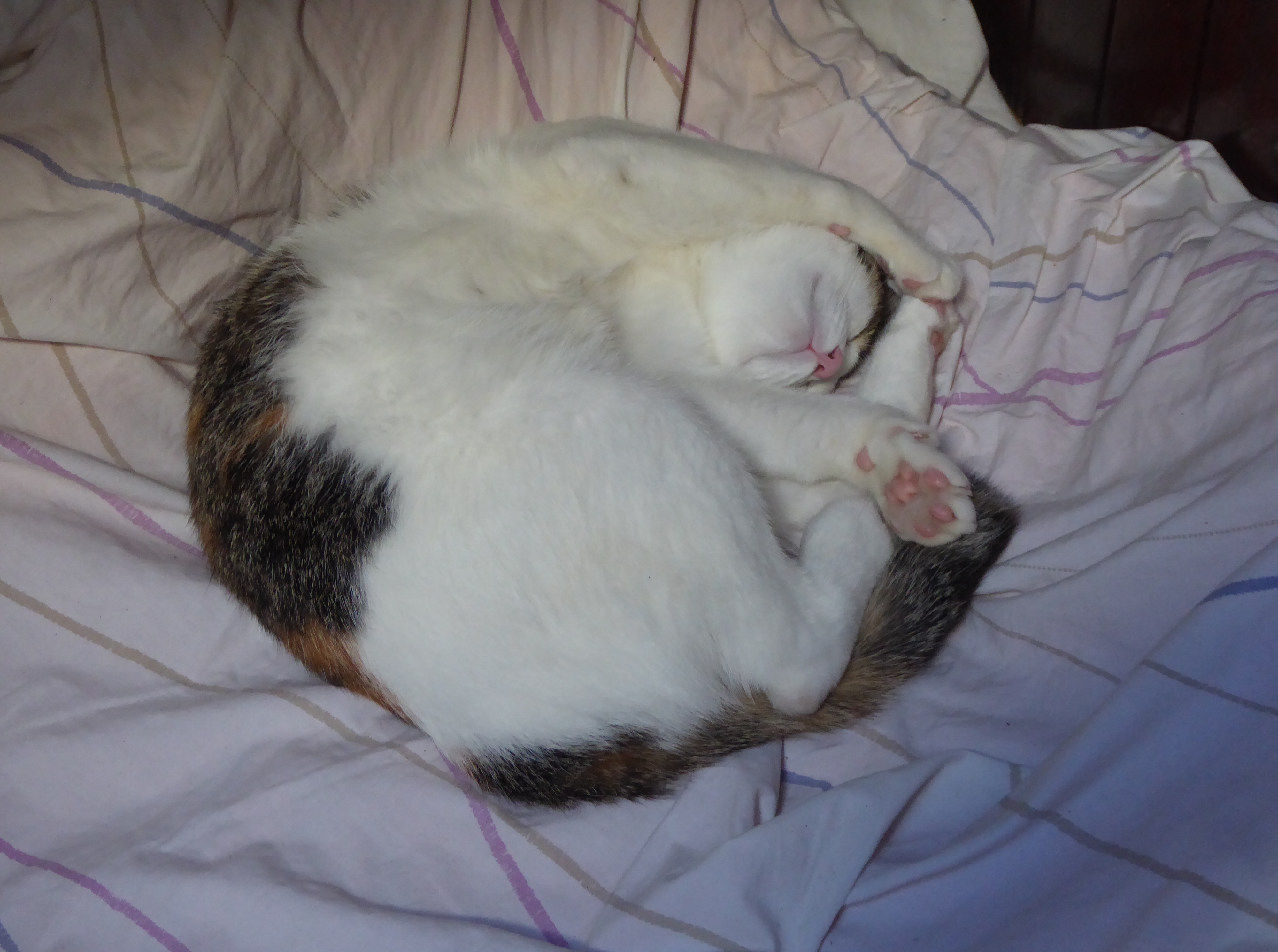
Tom, Emma, and Simon were interesting, kind, and very gracious people, but there was much less conversation on board than one might imagine. I suspect that sharing a limited space for long periods of time undoubtedly inspired their desire for both privacy and solitude.
Breakfast, was the exception. Emma would miraculously whip up delectable crepes, cakes, and bread in the tiny kitchen and we would gather around the table on deck to drink coffee, eat, and chat. There was no refrigerator so everything was fresh. Before leaving port we’d gone to the market and stocked up on fruit, soups, bread, personal snacks (this apparently was key to staying sane and happy on long ocean voyages), various essentials, and a few frivolities.
Tom chose a place to anchor for a few days. We could see a tiny village in the distance, but the boat’s keel wouldn’t allow us to get near . The following day a boy, from the village, paddled up in his pirogue and offered to sell us some fish. We had a delicious lunch that day.
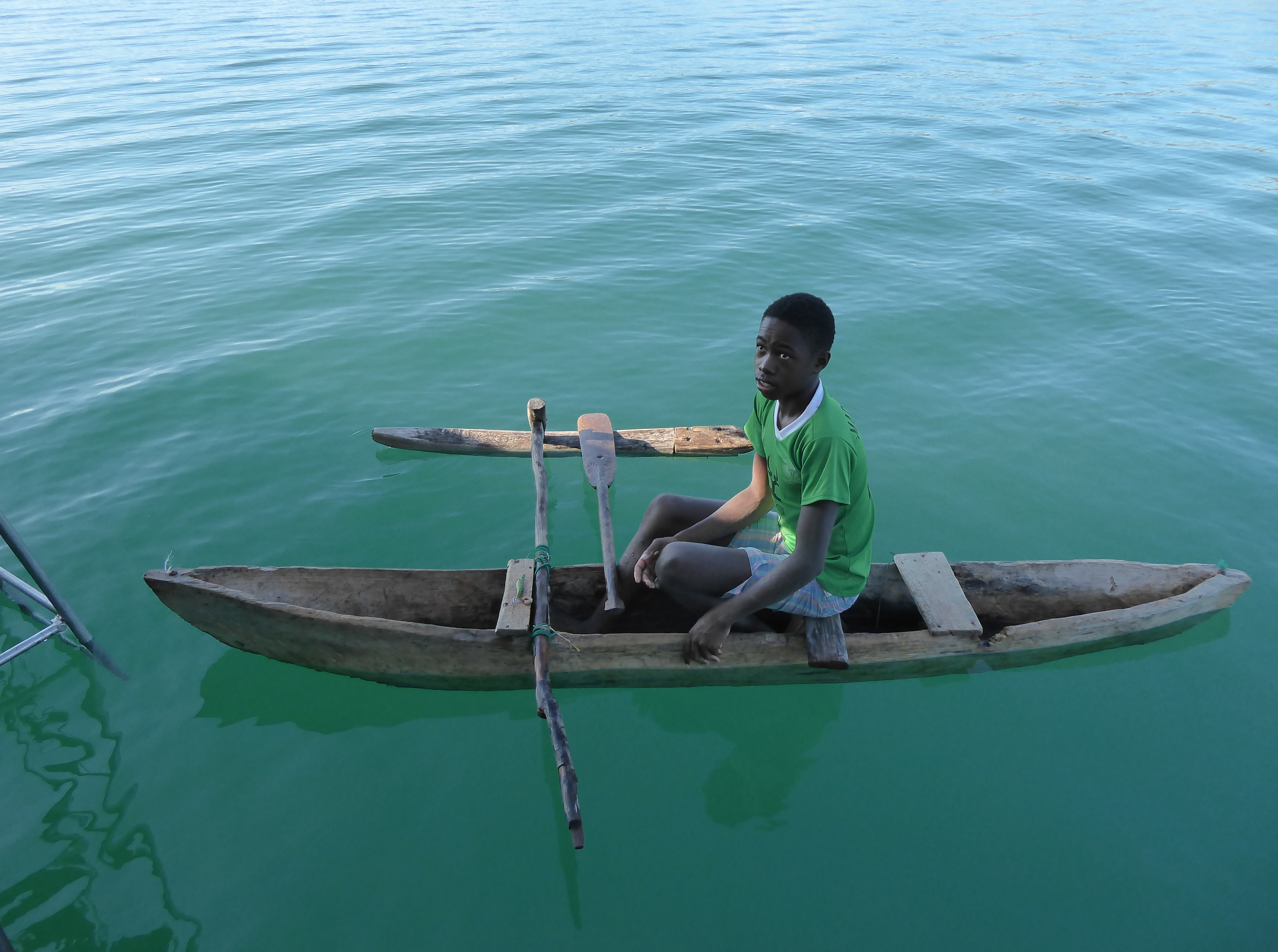
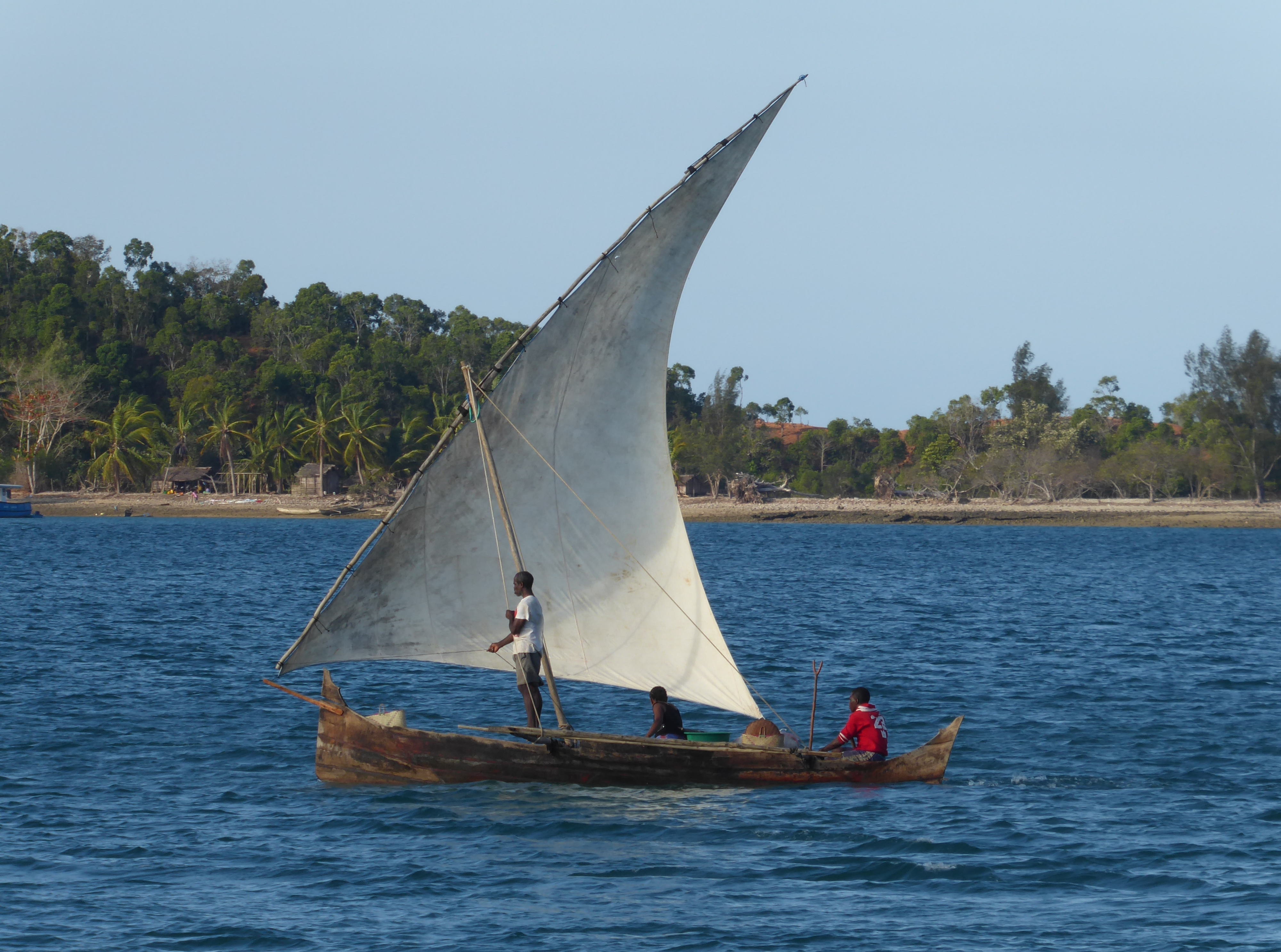
We had two kayaks on board and Emeline ventured toward the village the next day, but feeling intrusive she decided not to go ashore. But my curiosity was piqued. The following day I rowed over. It took about thirty minutes to get there and when I neared the shore a group of children came rushing over to greet me.
The boy, Flavio, who’d sold us the fish was there. He spoke French well and walking toward the simple wooden homes he started introducing me to the other villagers. Flavio’s grandfather gave me a warm hello and started dancing to the loud music coming from the large speakers outdoors, a group of men stopped playing dominoes to say hello, and soon I was sitting and chopping manioc with Flavio’s grandmother while other women helped too and giggled. Everyone in the village, about forty people, was related.
Afterwards Flavio gave me a short tour. There was a cow, a garden, and a few more simple homes that edged up to a forest, never far from the sea.
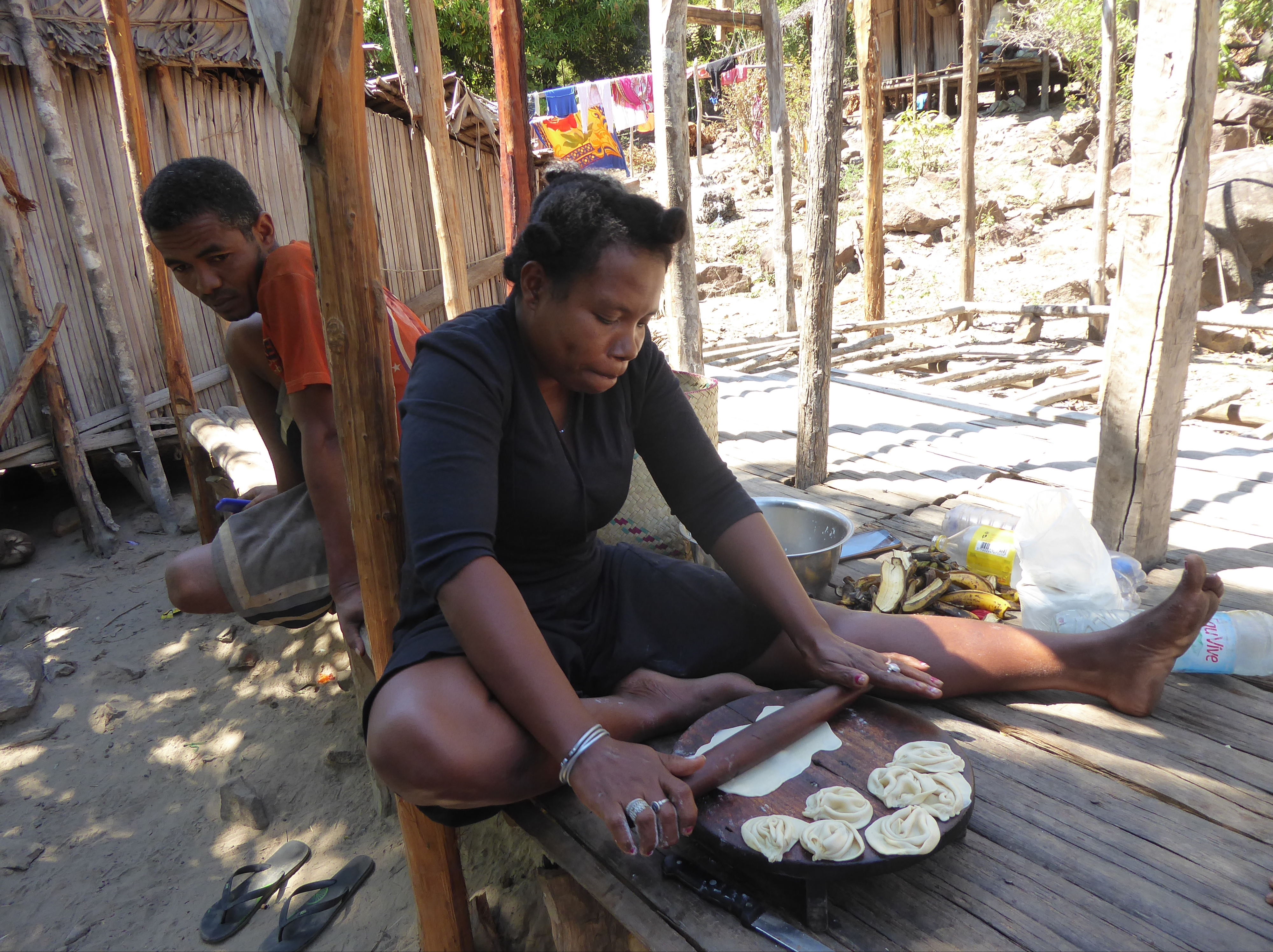
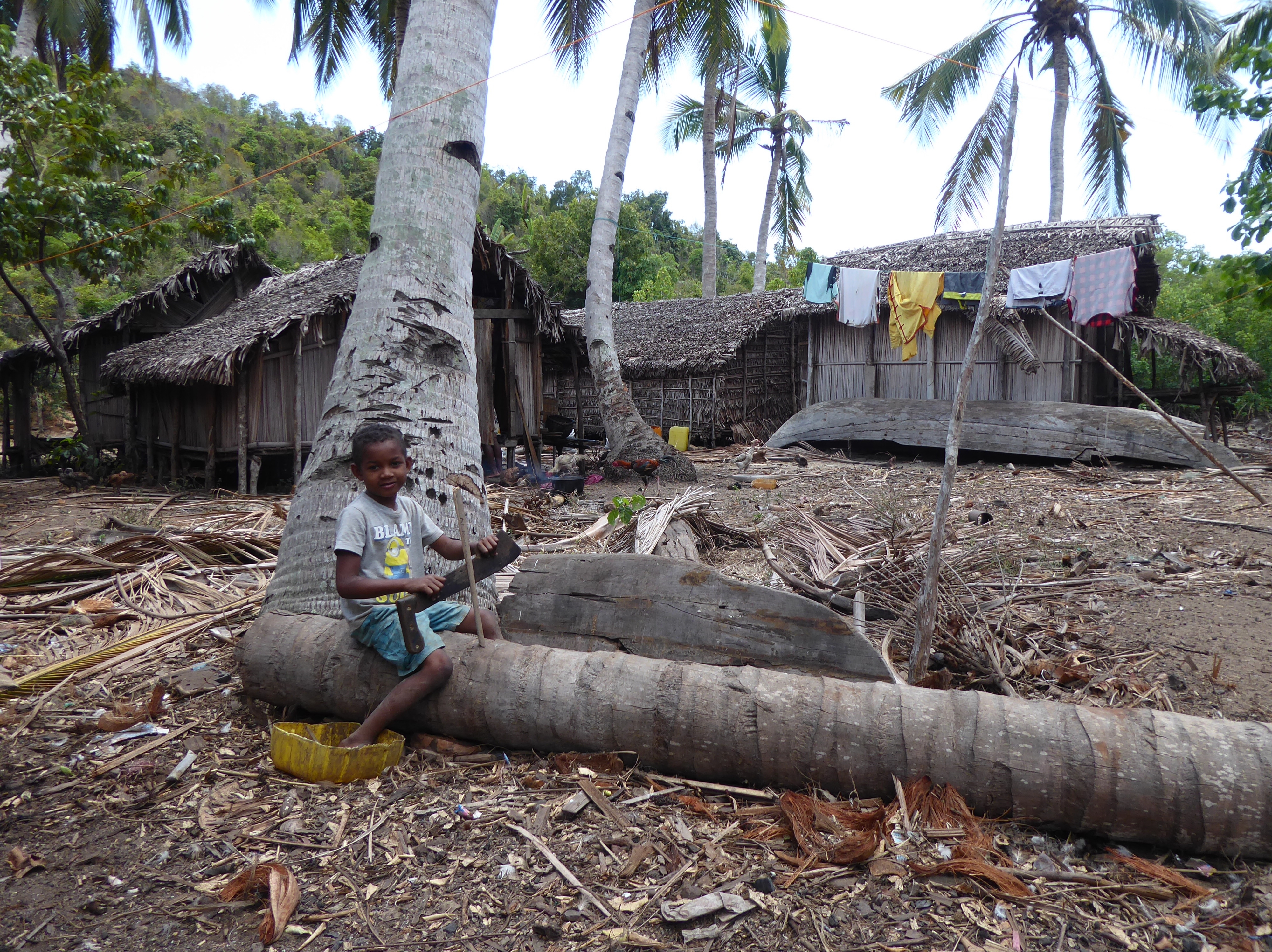
I was introduced to Theodore, Flavio’s uncle. He asked if I’d be interested in going in his pirogue on a four hour tour the following day. He was a pleasant young man who spoke French well. His son, Dora, a lovely, polite boy of thirteen would go too. I asked the price. He said 20,000 ariary (about $5).
The following morning, just after nine. Theodore and Dora came to pick me up from the Karaka. His pirogue had a slender mast and sail lying atop the outrigger.
I took a seat in the middle of the narrow vessel and Theodore and his son began to paddle, each with a single oar. Dora sat in the back steering with the same oar, his father sat up front.
When Theodore spoke to Dora it was always in a quiet tone and spoke to him not as a child, but as a man.
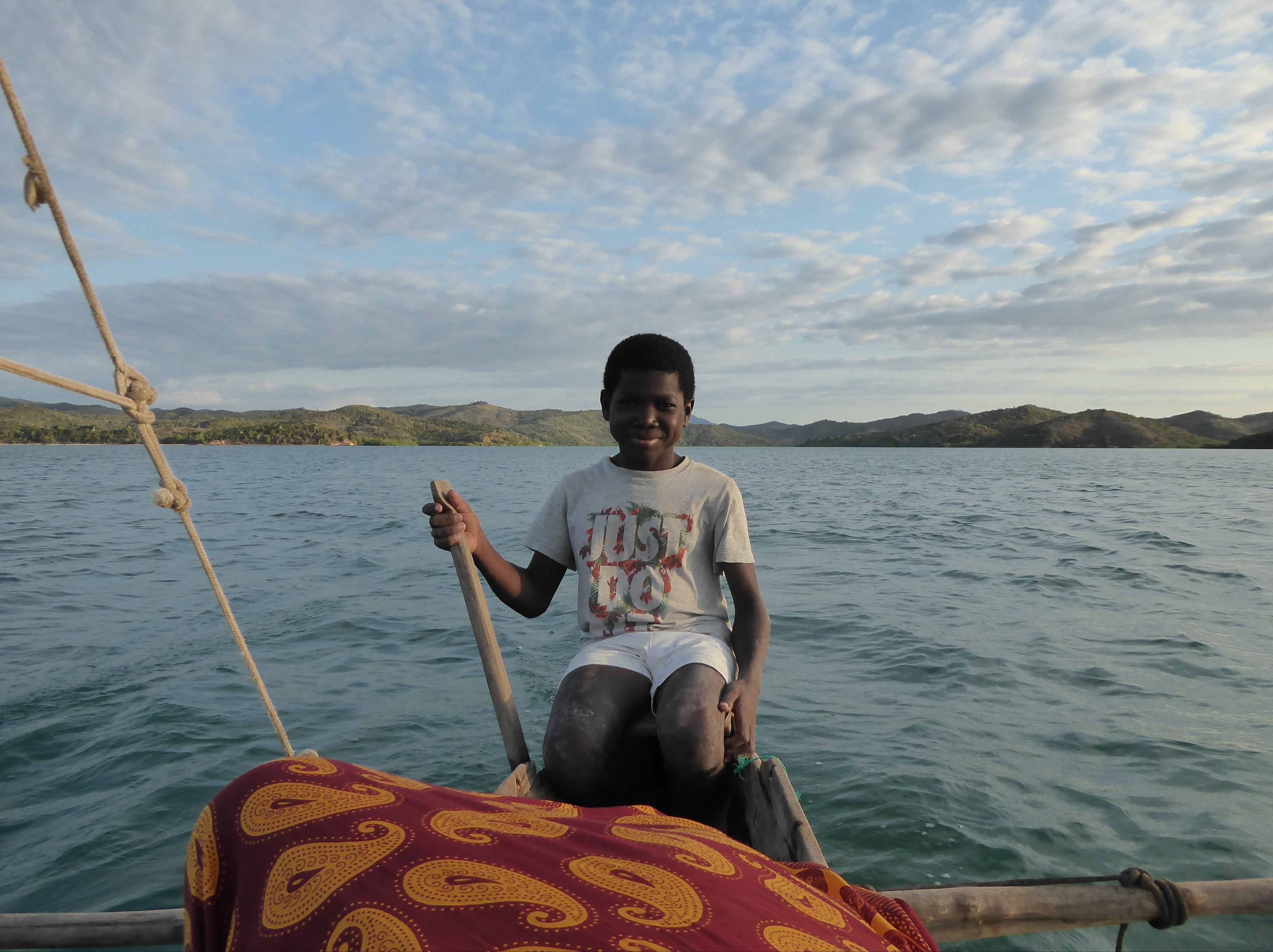
Theodore’ slender build, like Freeman’s, did not reveal his strength. He and Dora rowed continuously, rhythmically. I rowed too, but had to take breaks.
The sail lay unfurled. The wind’s direction was not favorable.
We rowed through the sea toward a wide river. Our pace was slow, but no one was in a hurry. All was calm. The weather, like the other days, was warm and sunny. Birds swooped down from the nearby trees hunting for fish. We passed an older couple rowing in a periogue too, then a small boy traveling alone using a plank of wood as his oar.
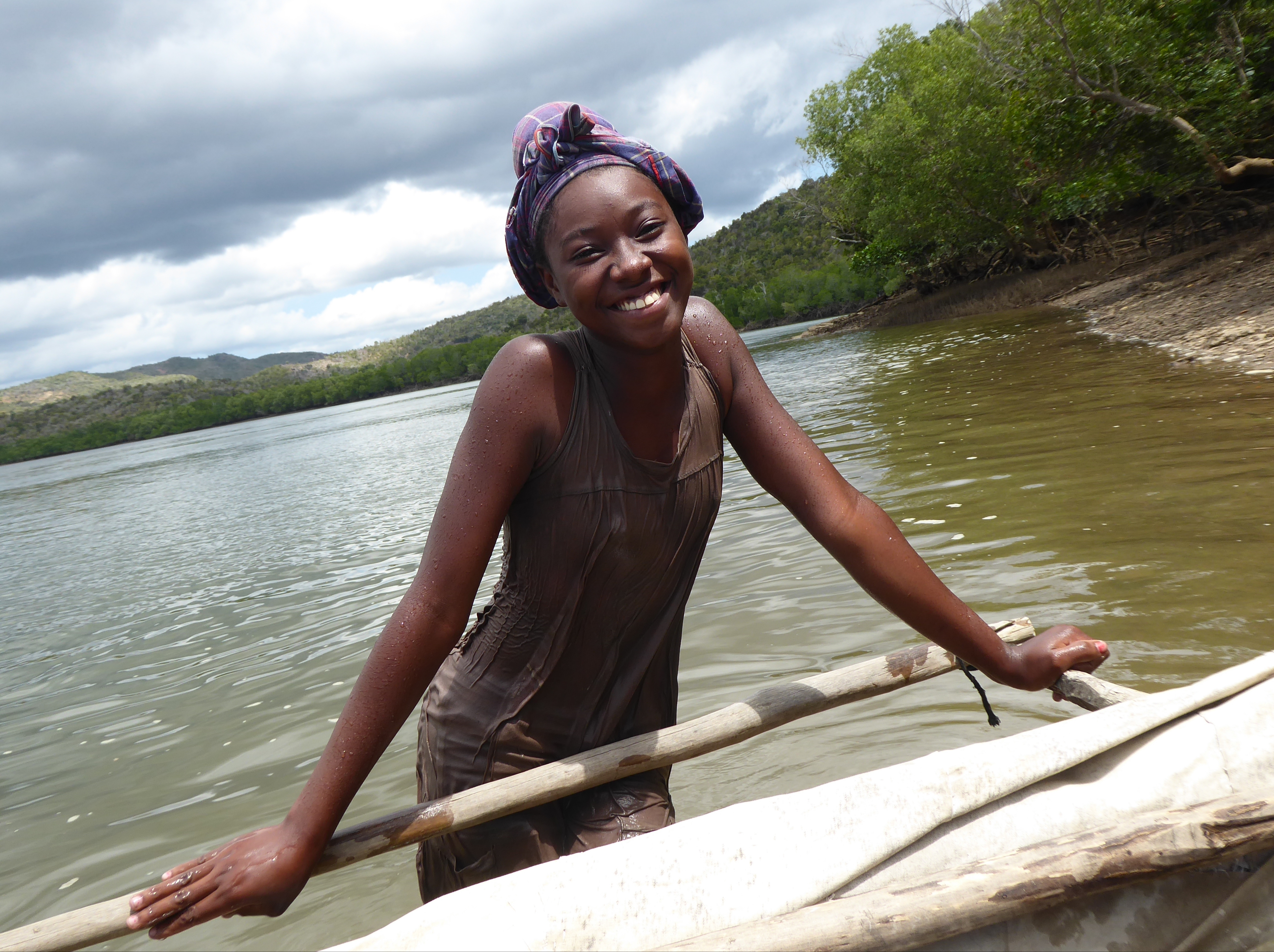
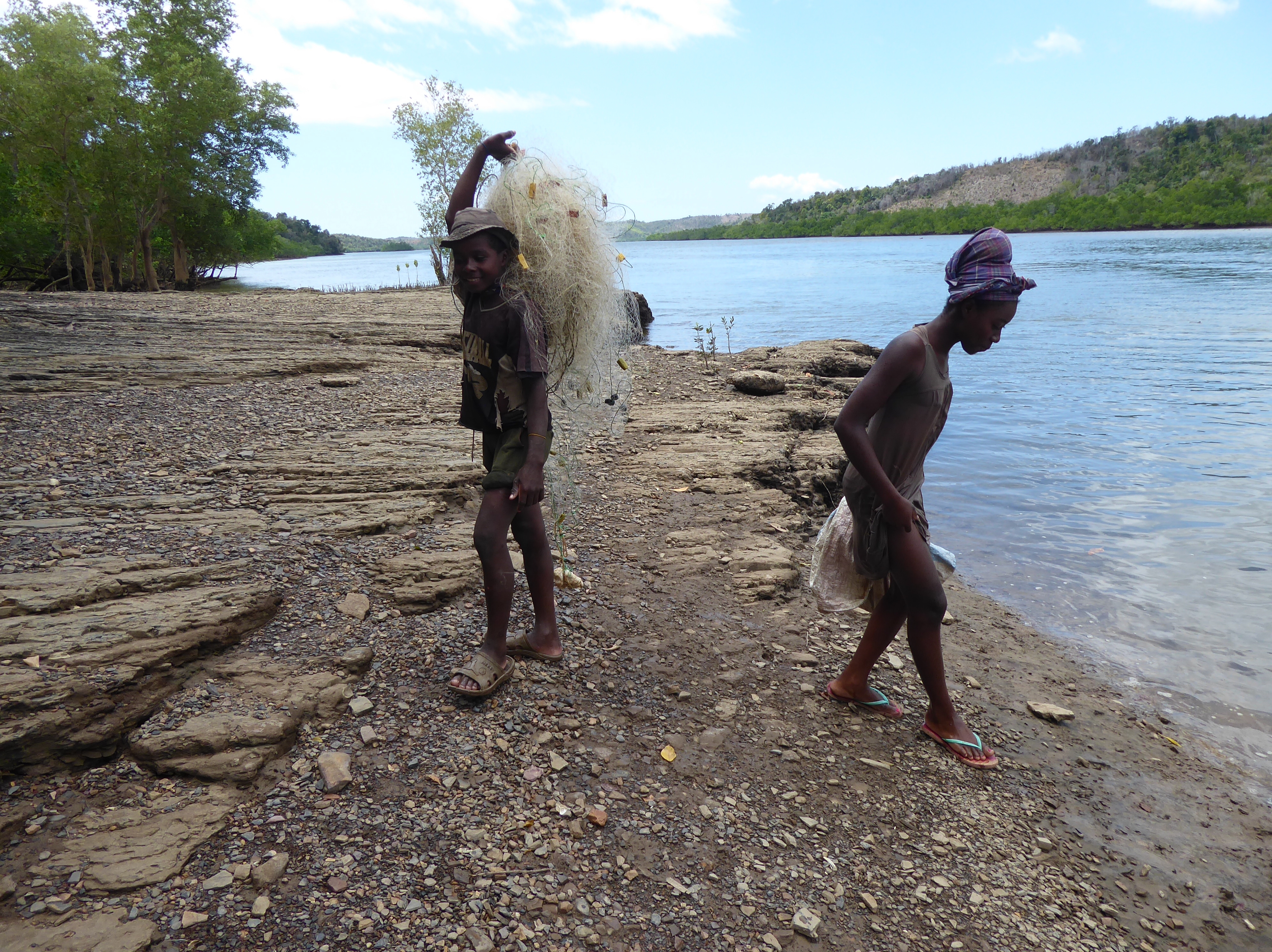
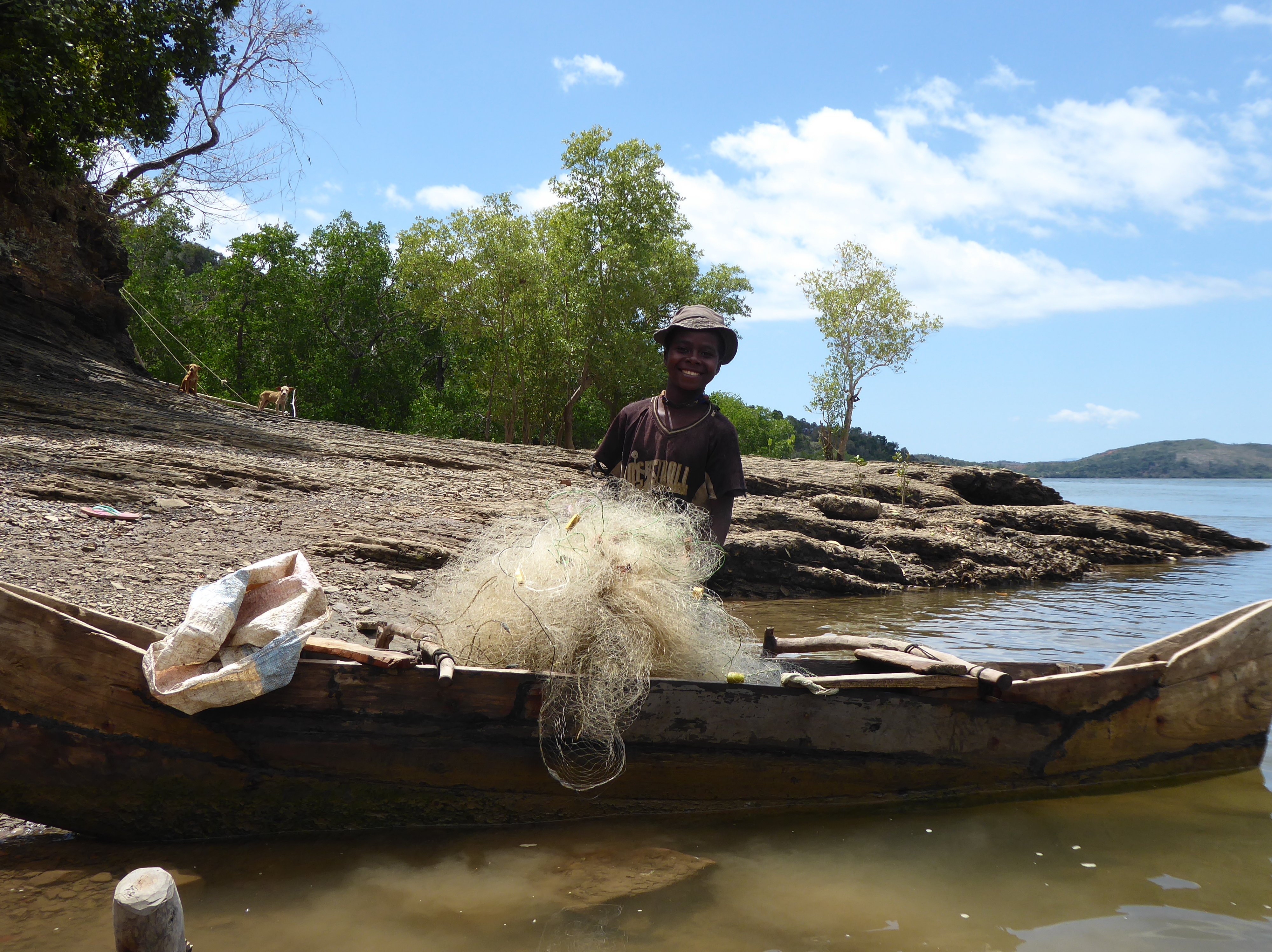
We passed small villages. Theodore would ask if I’d like to stop and visit them. I never refused. Each was unique. One consisted of just four homes.
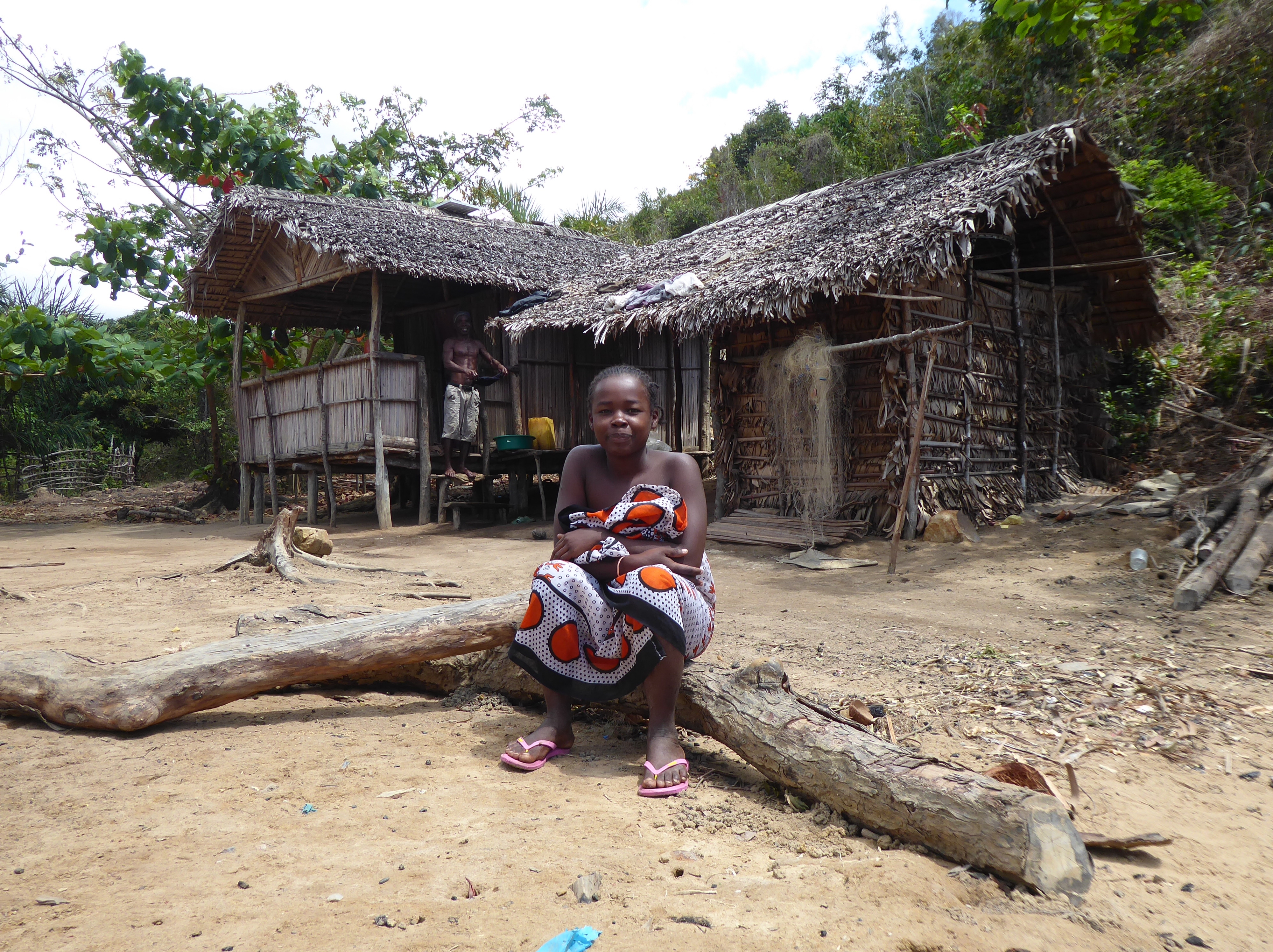
Another was somewhat larger with racks of fish left out to dry. Another larger still had dozens of chicks scurrying about and people sitting around on plastic chairs. But the simple wooden dwellings were largely the same. And there were no roads that I could see. People traveled on the river and the sea.
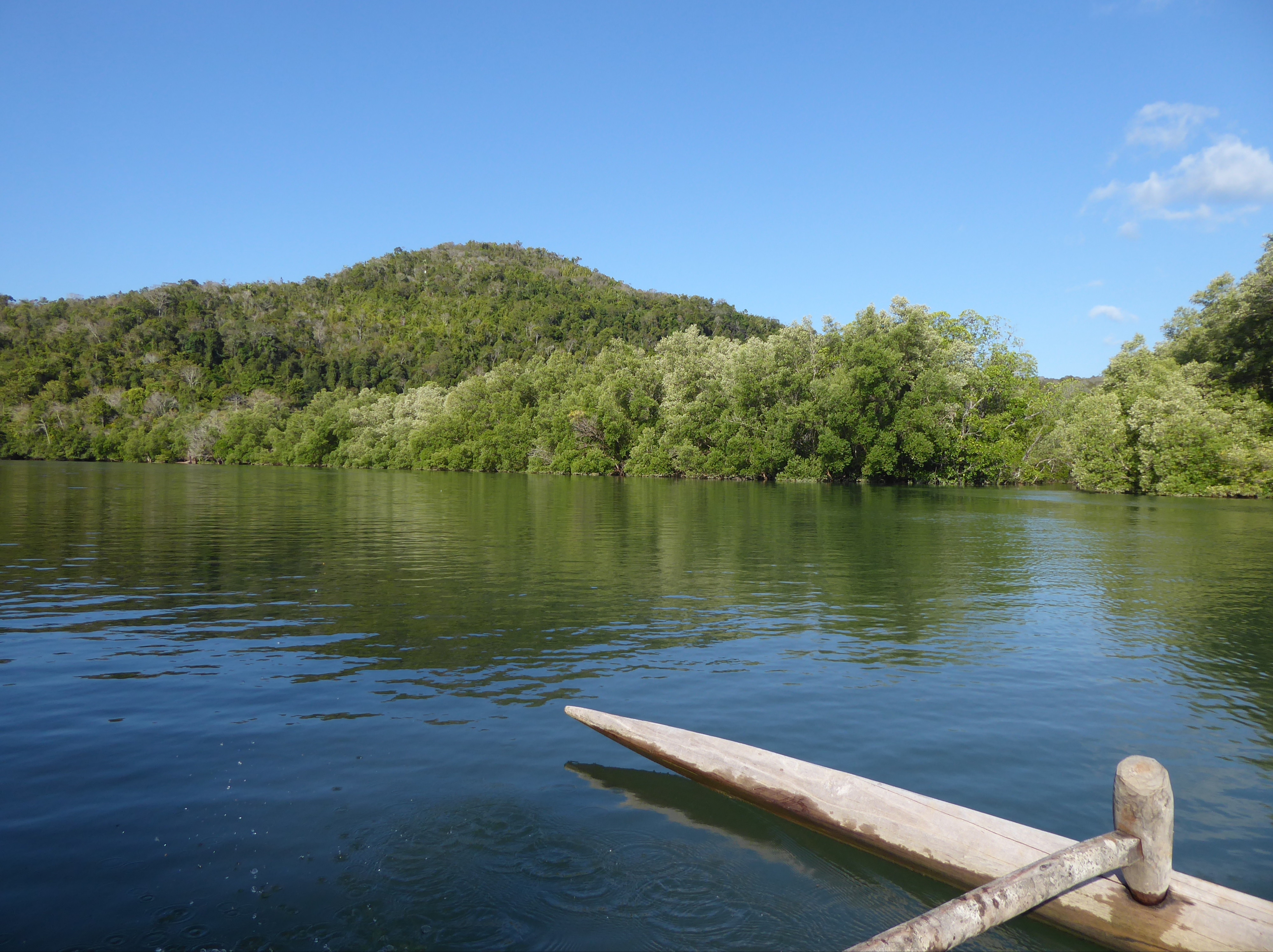
Theodore seemed to enjoy walking me through each village. My presence was largely welcome, sometimes there was indifference from the residents, but I never felt unwelcome. My request to take a photo was always accepted. Many people seemed delighted I asked.
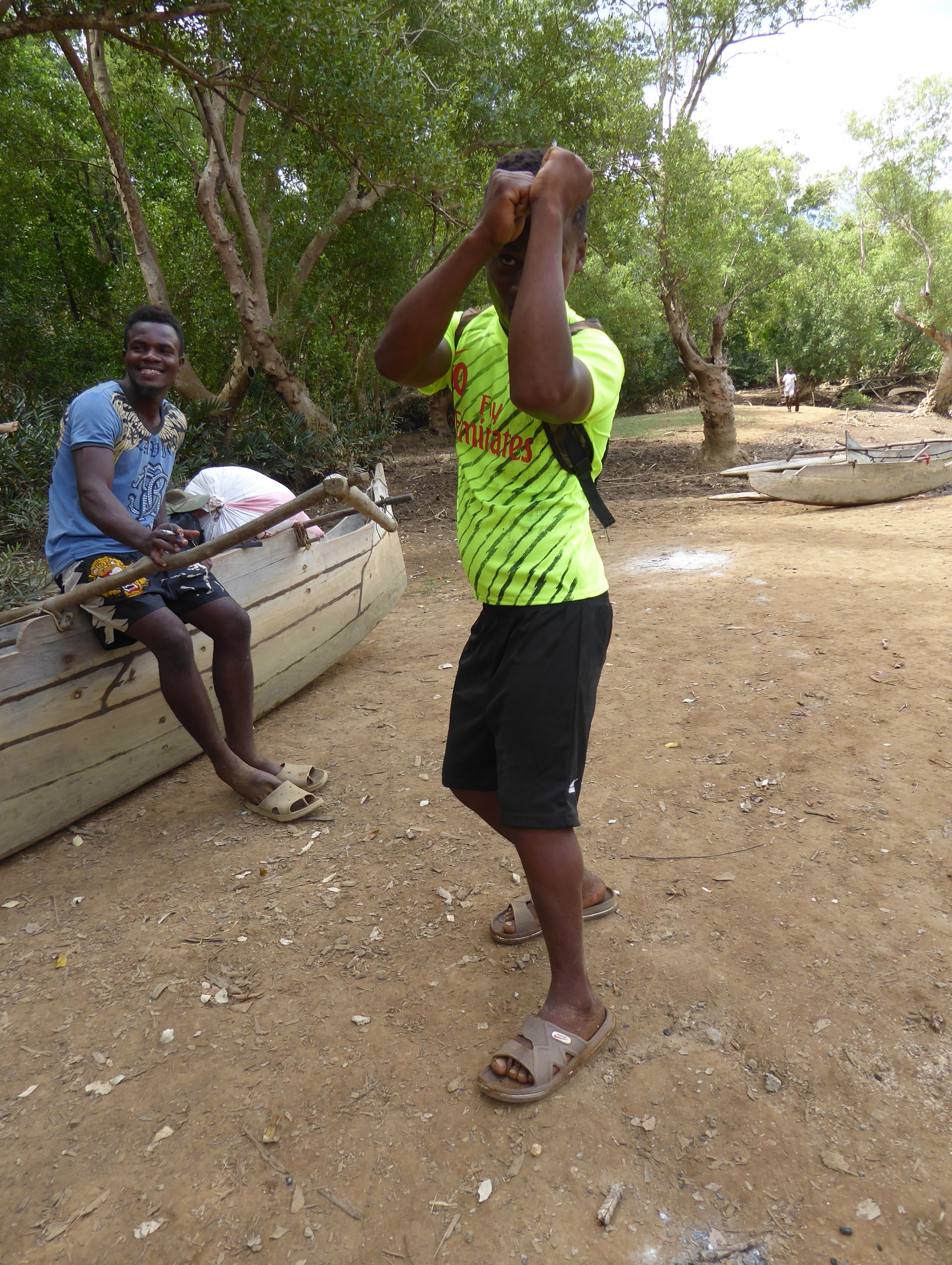
As we made our way down the river the wind remained elusive. We rowed and rowed. When a motorboat approached Theodore arranged for us to get a tow,
The motorboat took us to a dead end. Leaving the pirogue behind and the oars hidden in the brush we walked until we reached a huge market. People were carrying bags of goods, selling CDs, clothing, fruits, vegetables, housewares, and socializing. Children stared at me with curiosity, but always returned my smile. Market day meant a gathering of people from villages near and far. It was a wondrous, fascinating scene.
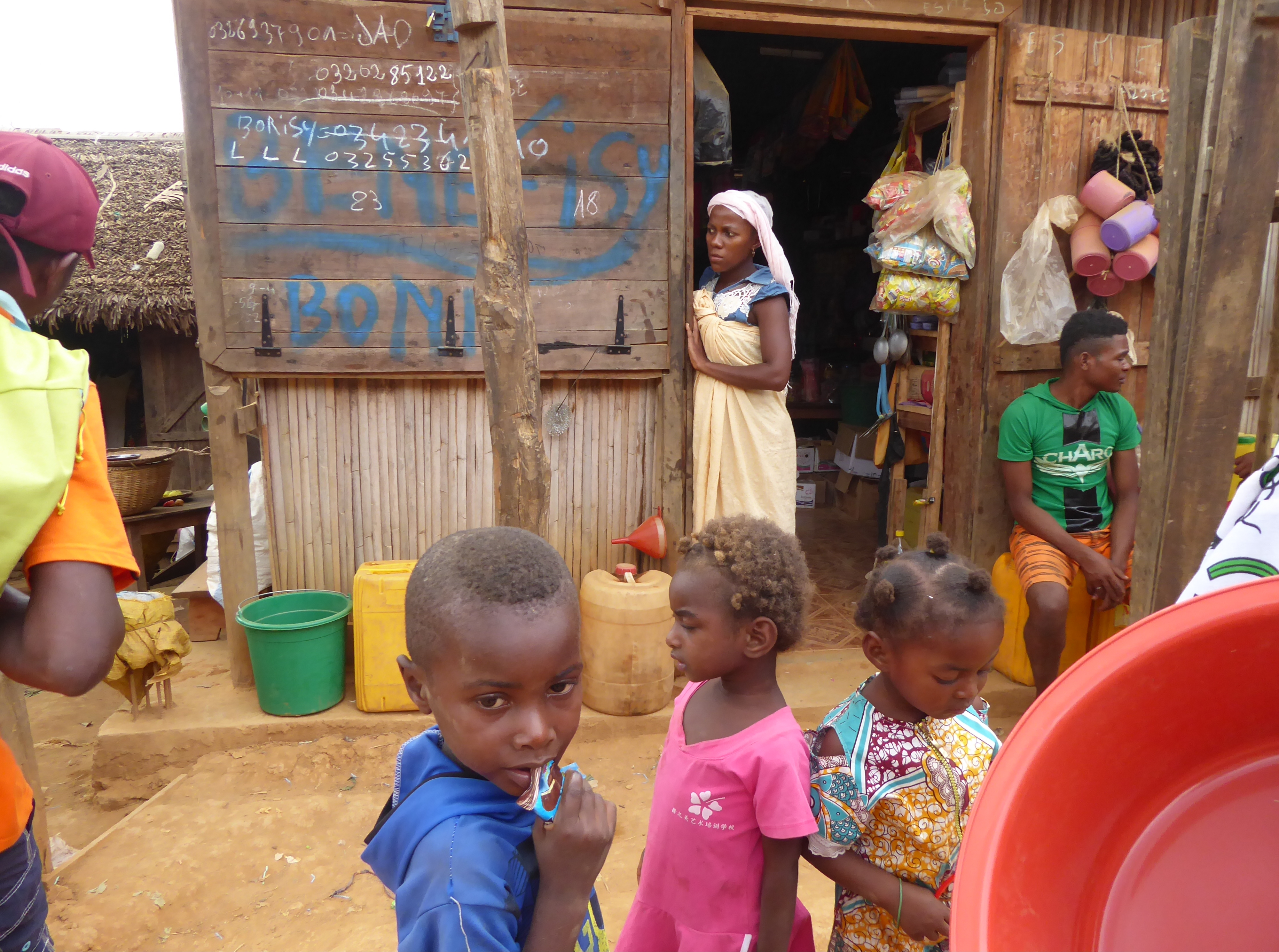
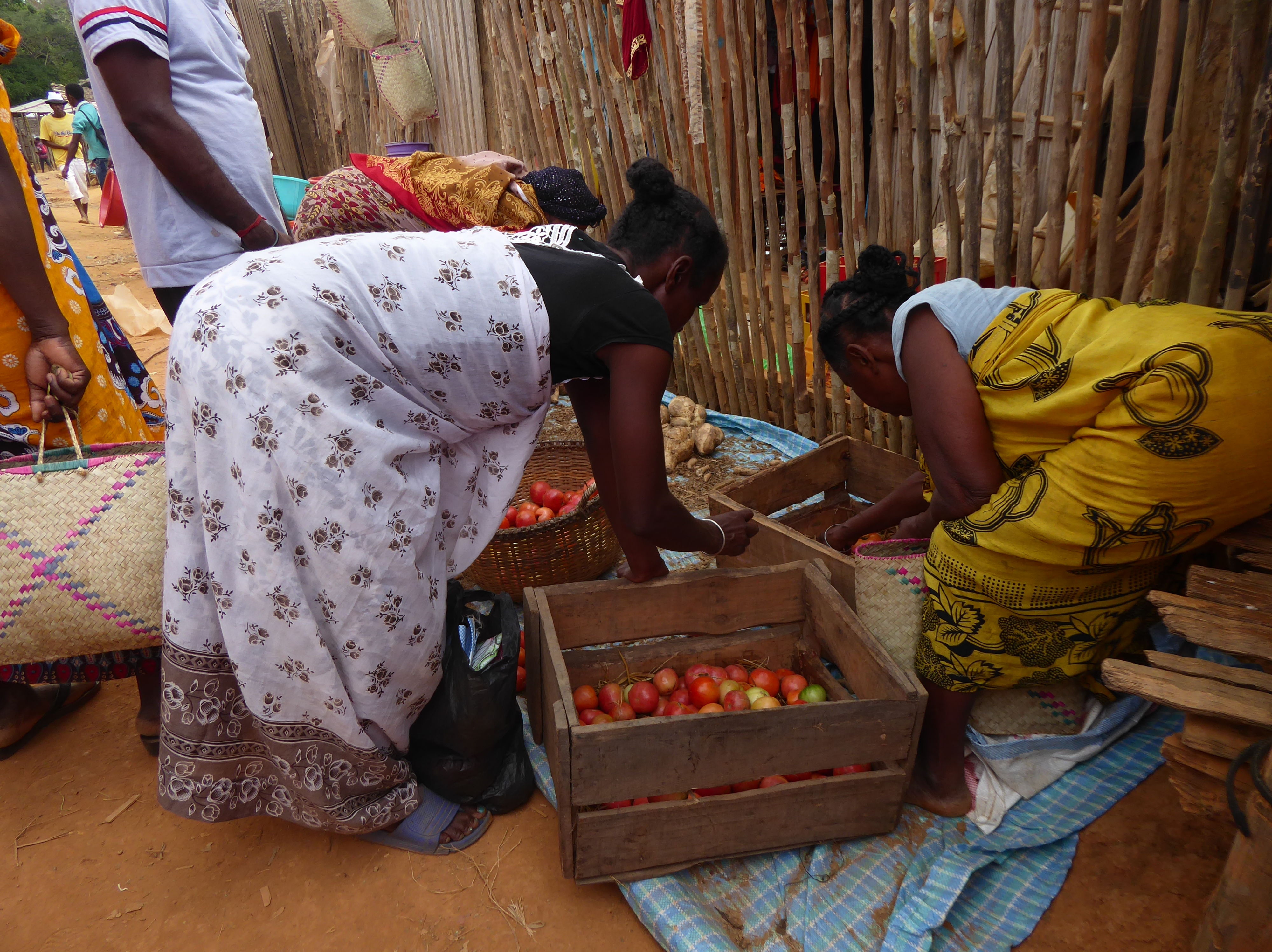
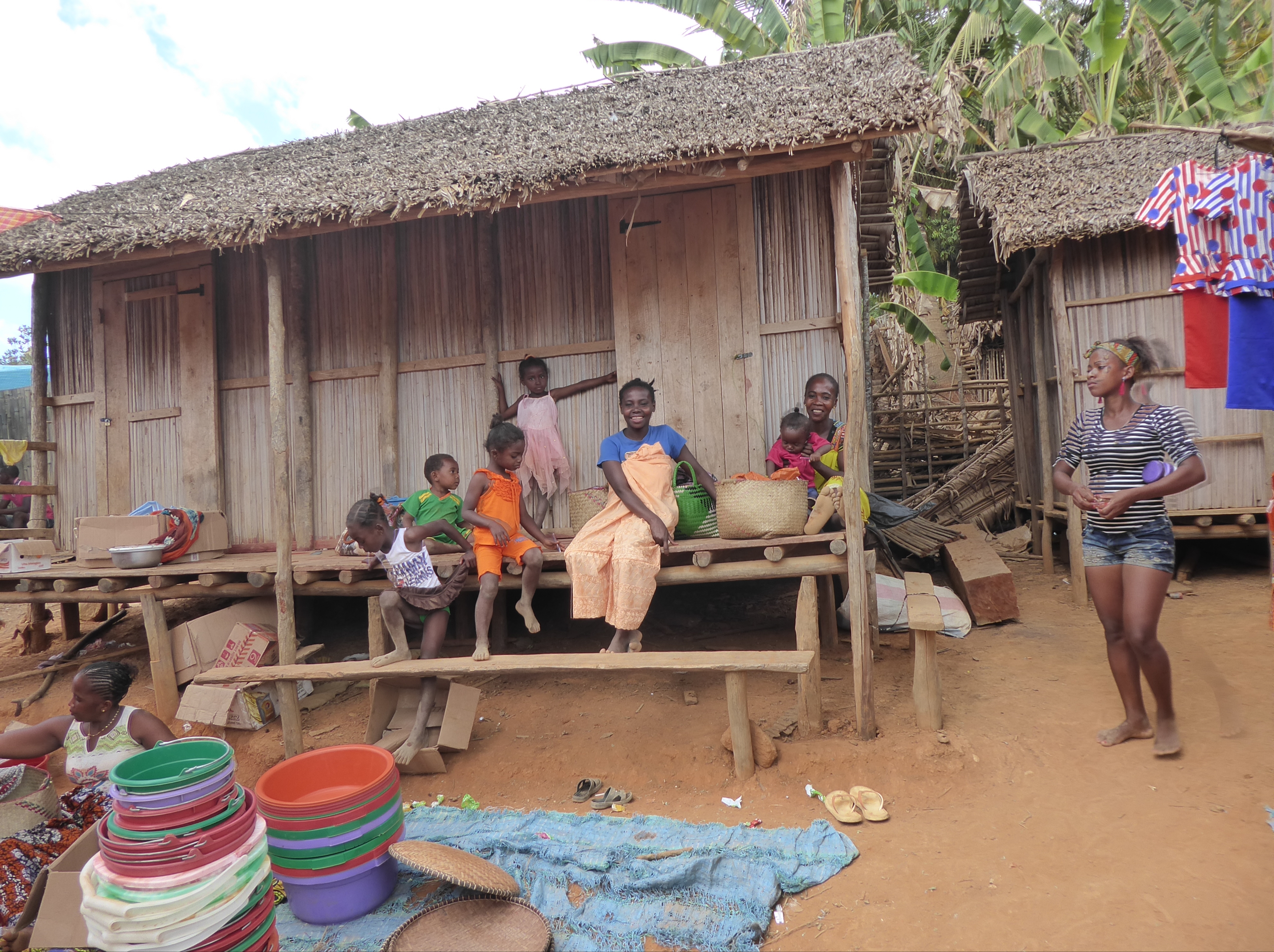
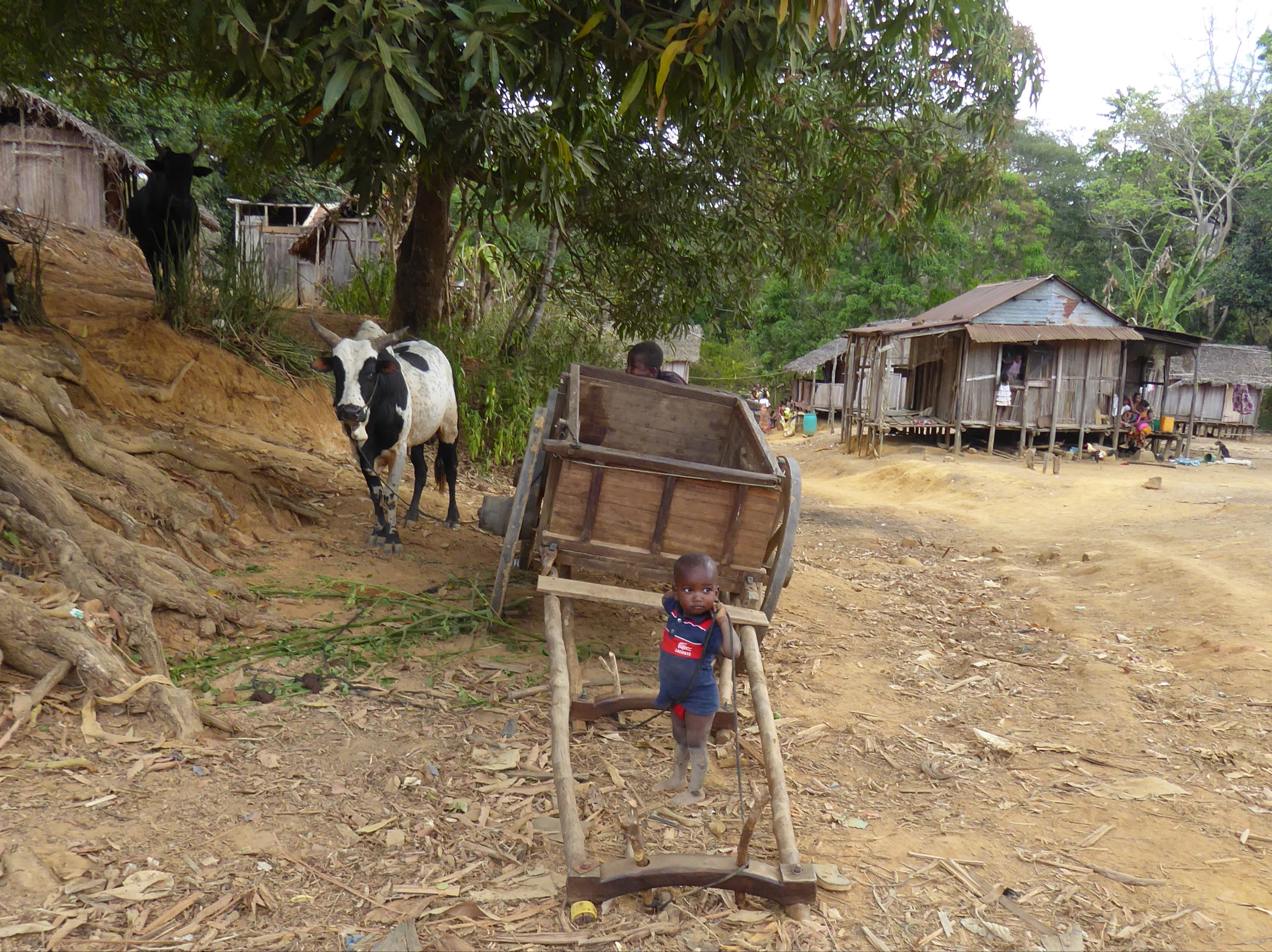
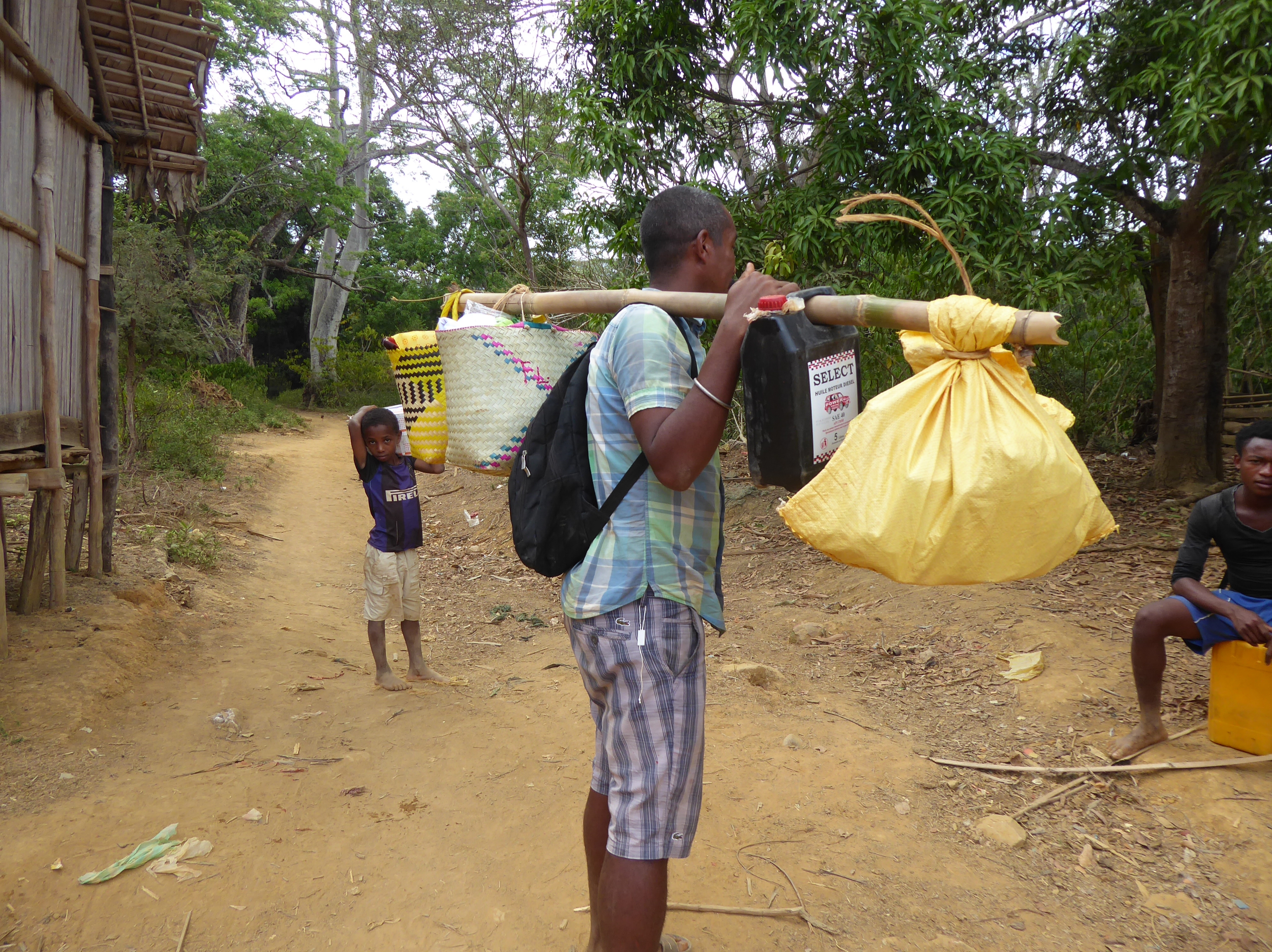
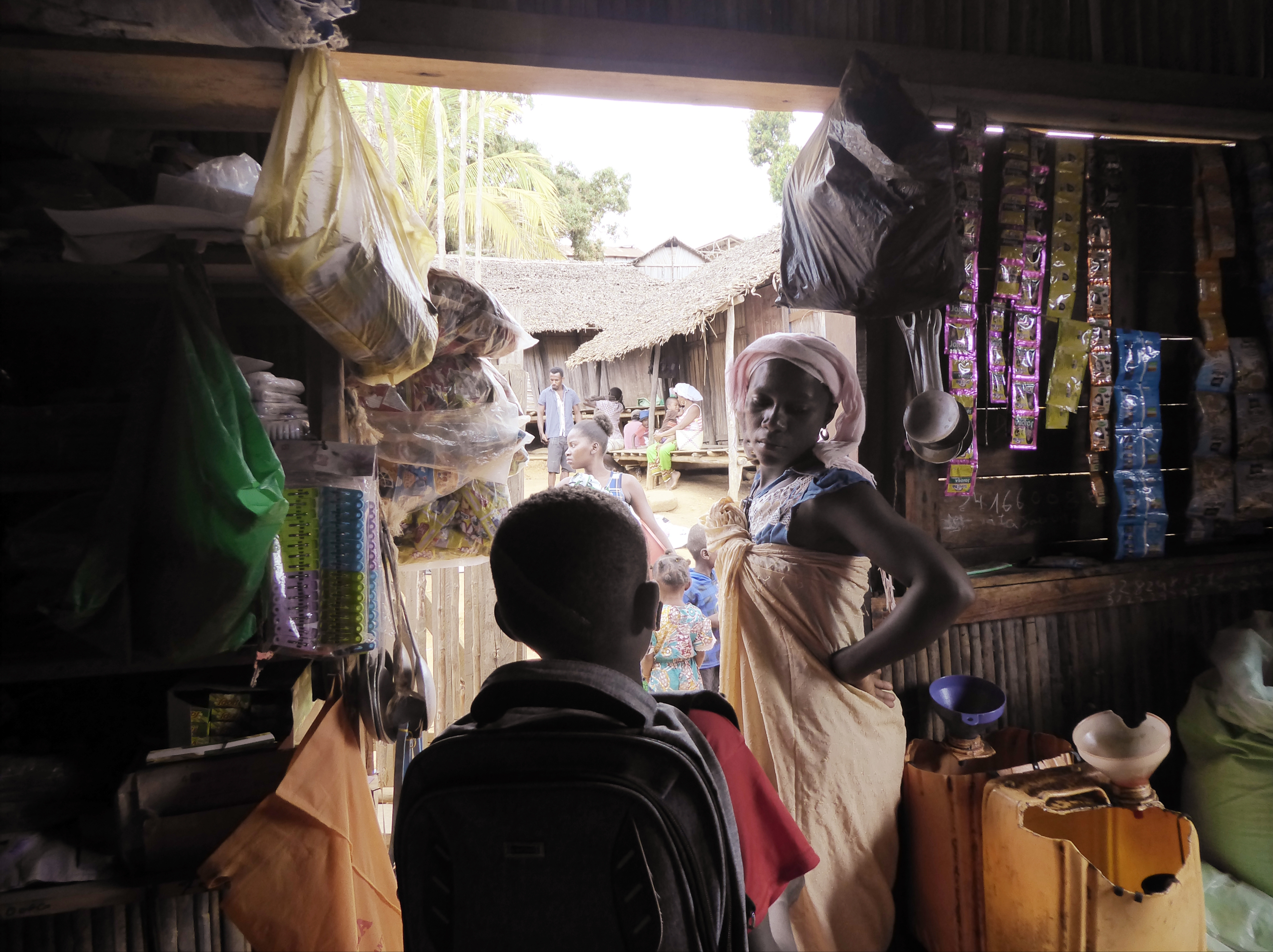
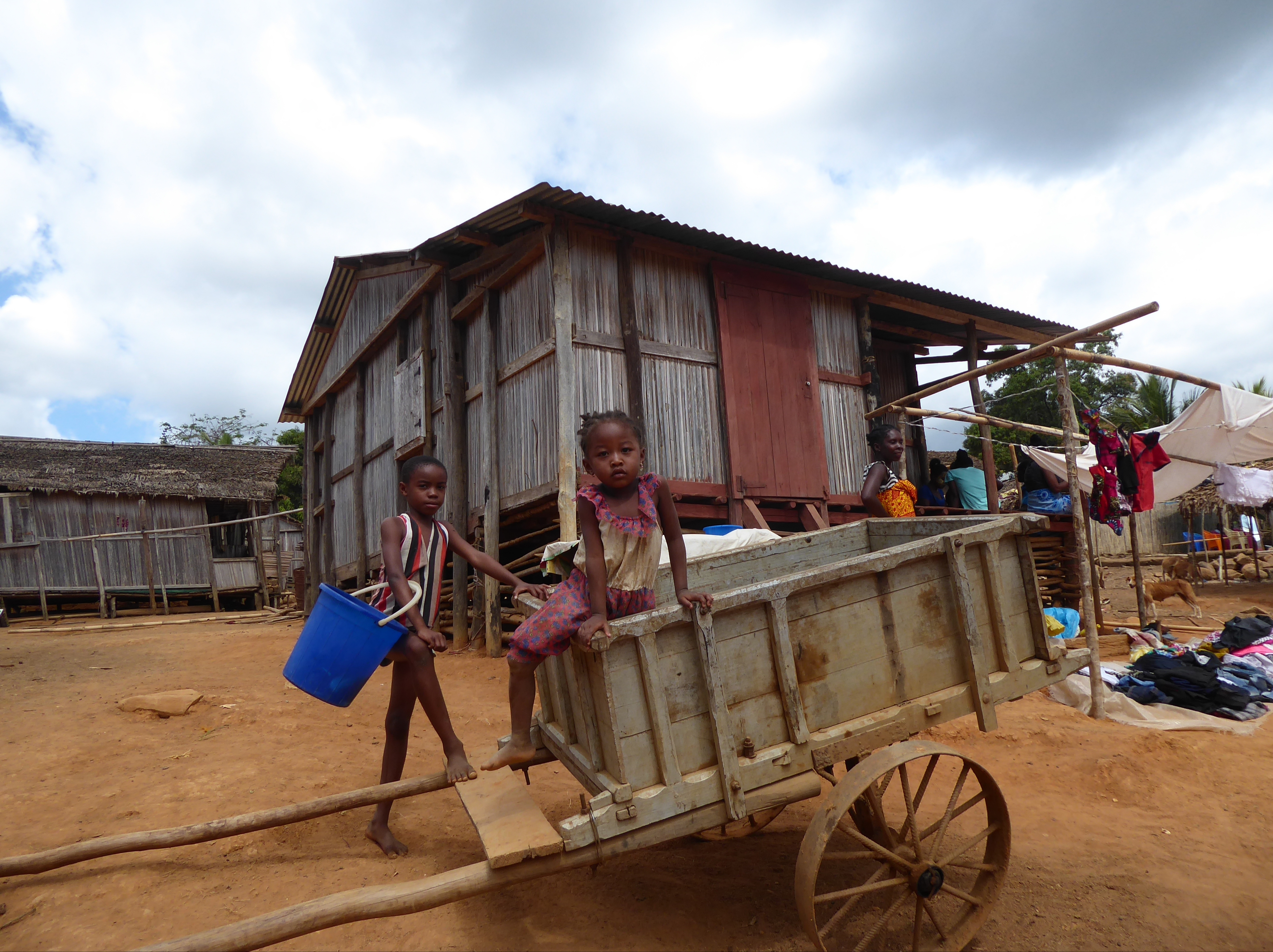
It had taken us several hours to get there and Theodore excused himself to buy some rope and other things. After some time, it was getting late and not knowing how long it would take to get back I reluctantly suggested we go.
The wind for short spells would blow favorably and carry us along. I relished each moment.
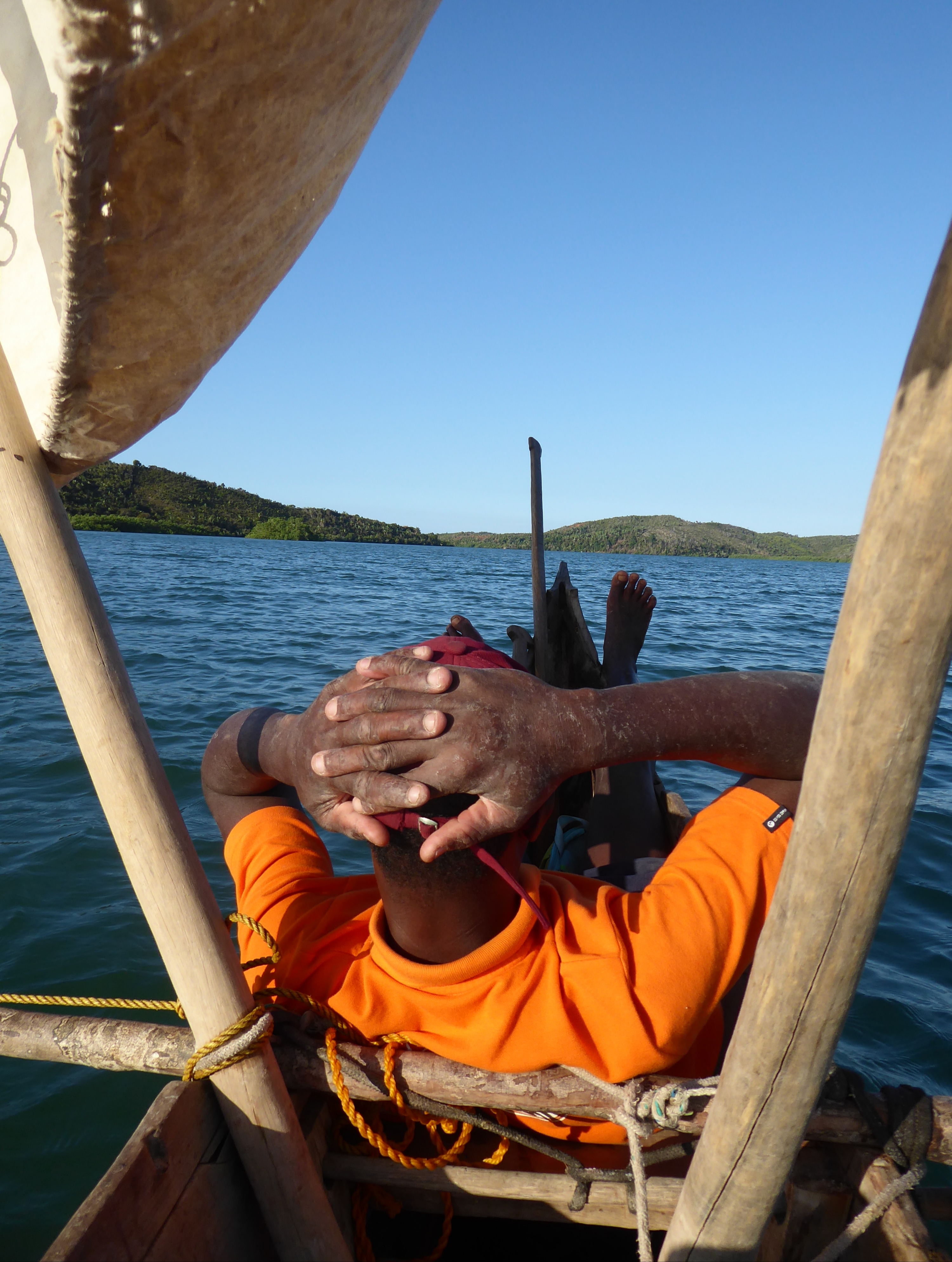
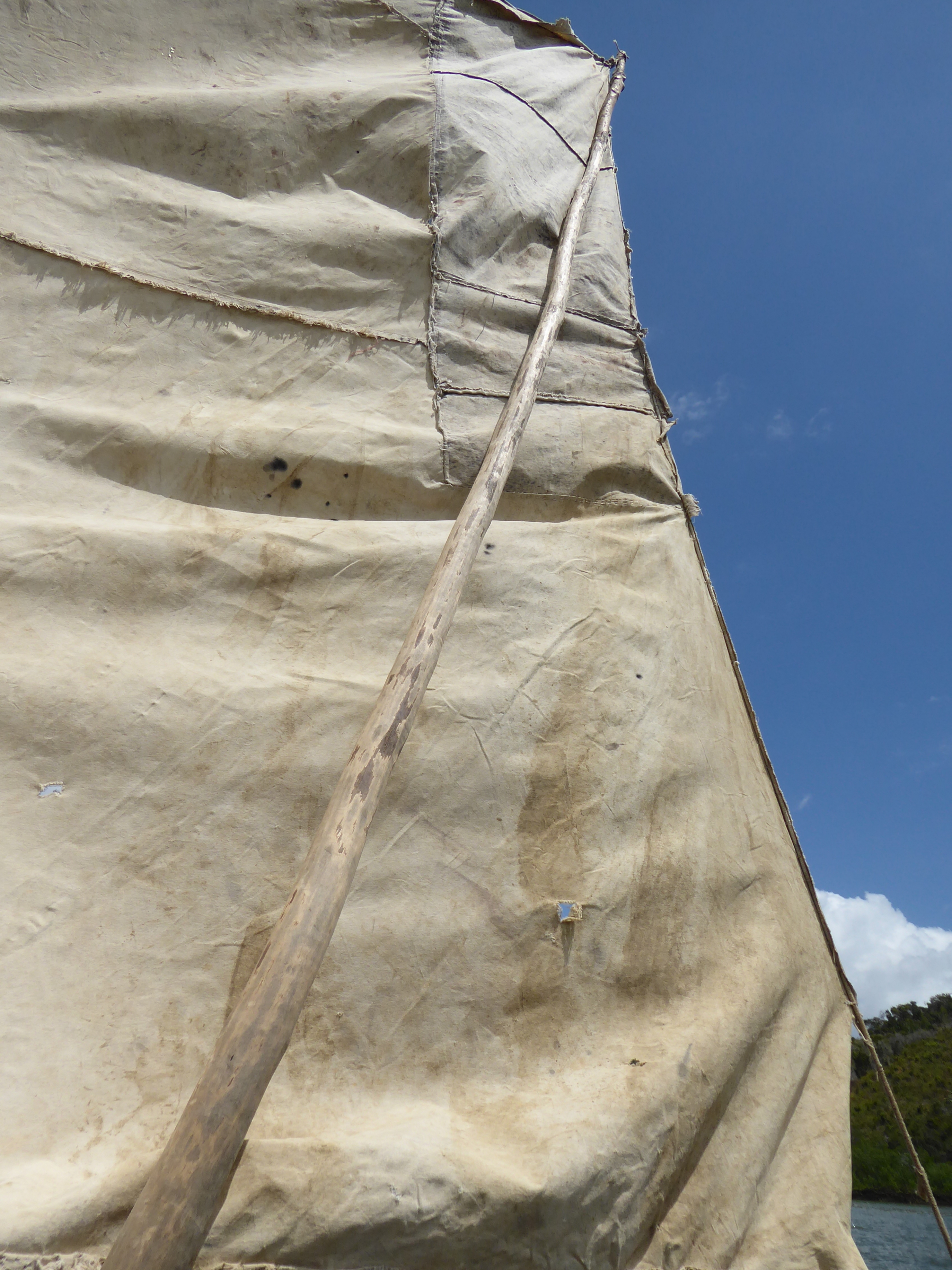
Otherwise we rowed.
Our “four hour” tour extended to eight hours. We returned to the Karaka at dusk. My shipmates looked relieved. (Although Theodore never mentioned money, I compensated him for the additional time.) I said goodbye to him and Dora and thanked them for an extraordinary day.
After many months at sea , Tom and the others were looking to enjoy a dinner out and a more animated atmosphere. We set sail the following morning for Nosy Komba. It had the reputation of being a laid back, pretty, tourist island. It was, but compared to where I’d been and what I’d seen, it also seemed inauthentic and brash.
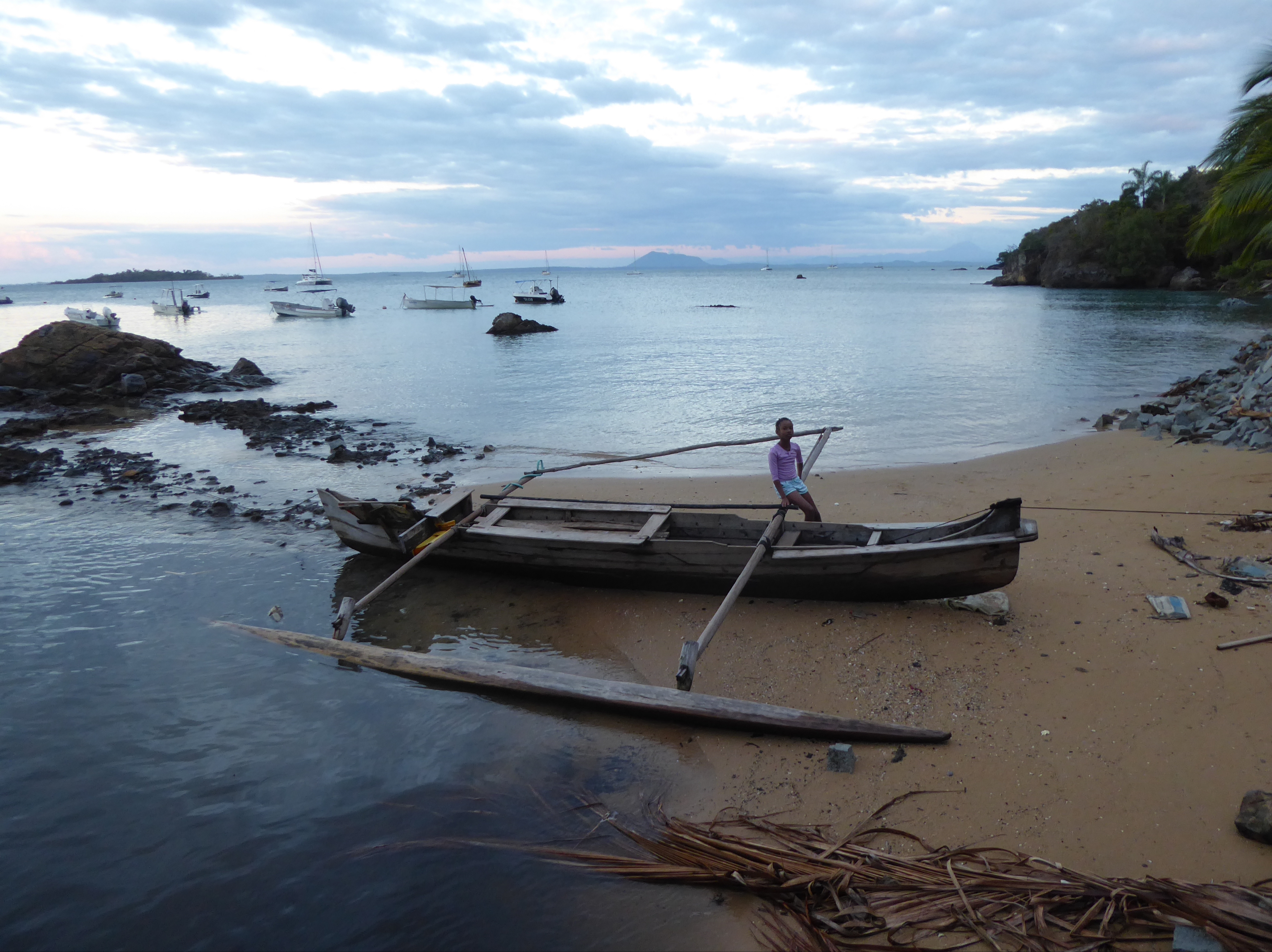
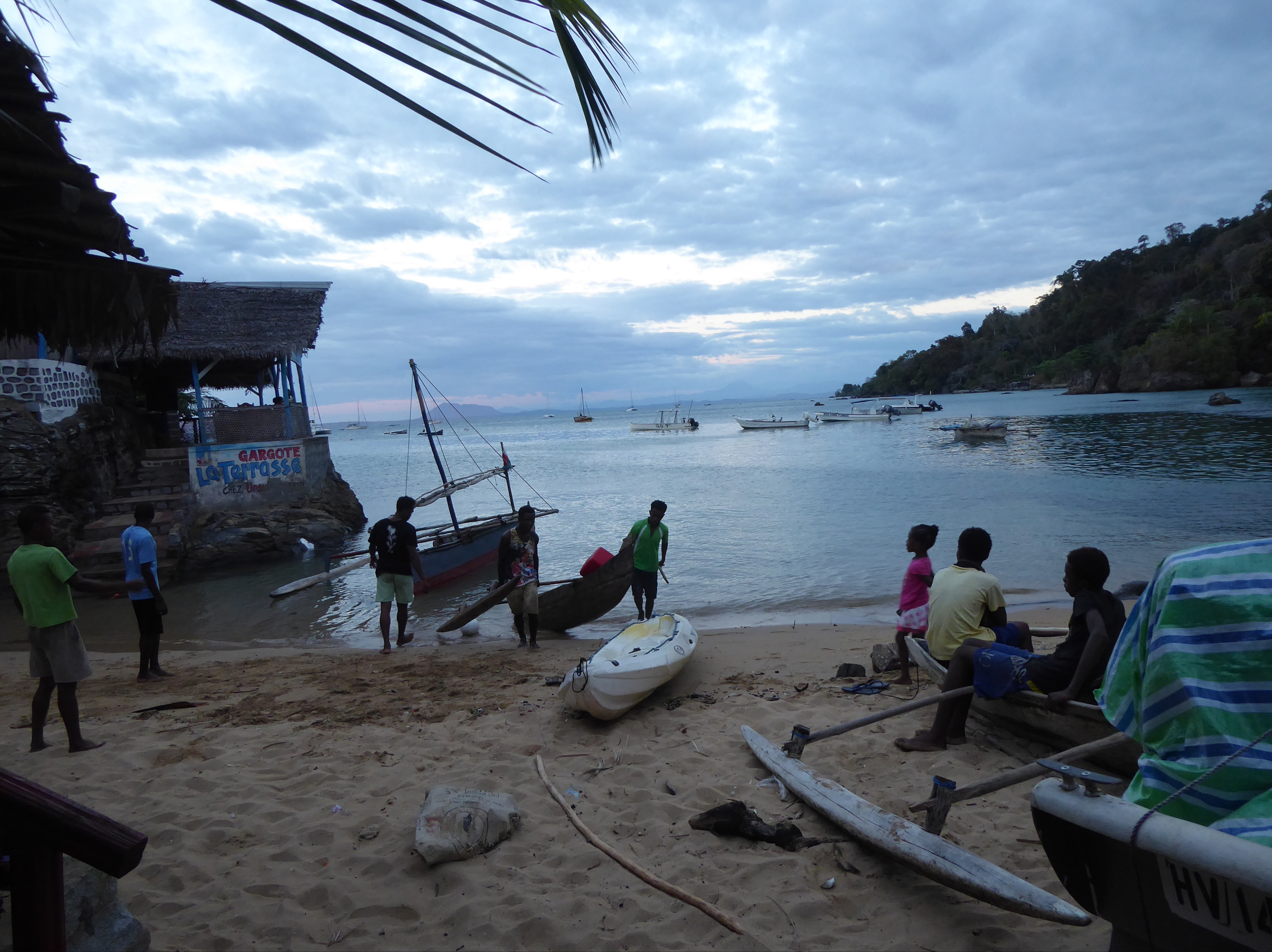
The places I’d thought of visiting in Madagascar, no doubt beautiful, but all well-trodden on the tourist trail, suddenly had little appeal.
There was some things I needed to take care of back in New York and doing them sooner rather than later was ideal.
I decided to leave Madagascar, foolishly or otherwise, with my spectacular memories still fresh in my mind.
